MISSISSIPPI’S PRECIOUS GEM








BASS TIPS FOR REDFISH






YOUR NEW FAVORITE SUGAR COOKIES

MISSISSIPPI’S PRECIOUS GEM








BASS TIPS FOR REDFISH






YOUR NEW FAVORITE SUGAR COOKIES
March means it’s Cooperative Youth Leaders time. The Electric Cooperatives of Mississippi’s Cooperative Leaders Workshop is set for March 1 – 3 in Jackson.
The three day-workshop features a true cooperative learning atmosphere where 83 high school juniors from all around the state will participate in cooperative teambuilding exercises.
The students will also have breakfast with their state lawmakers, hear speeches from Gov. Tate Reeves and Secretary of State Michael Watson, visit the State Capitol, attend a townhall


awards $50,000 grant for I-59 Supply Chain Park

Cooperative Energy and its local member distribution cooperative, Dixie Electric Power Association, awarded a grant to the Economic Development Authority (EDA) of Jones County’s I-59 Supply Chain Park project. The $50,000 grant is from the “Cooperative Competes” grant program for site development. The program seeks to increase the competitiveness of industrial sites in Cooperative Energy and Dixie Electric’s service areas.
Located adjacent to Interstate 59 midway between New Orleans, Louisiana and Birmingham, Alabama, the I-59 Supply Chain Park o ers 20 to 124-acre parcels with interstate frontage. The industrial park is supported by both Jones and Forrest counties, allowing for additional public support for industrial park development.
The park is adjacent to the Hattiesburg-Laurel Regional Airport (HLRA), which o ers both commercial and general aviation services. The property is owned and managed by the HLRA Airport Authority; however, is not within FAA control, allowing for innovative land and incentive structures. Being located adjacent to the interstate, and within minutes of customized training at The University of Southern Mississippi’s Polymer Science Department and Jones College’s Advanced Technology Training Center, makes this park perfect for light manufacturing and distribution facilities.
meeting, and interact with motivational speakers.


Students are selected through various programs — educational opportunities, and/or interviews — conducted by their local electric cooperative.
The workshop is funded by the local electric cooperatives.
The 83 juniors will then attend the program’s Youth Tour of Washington, D.C. in June.

This year’s program is the 36th workshop.

Power use will drop slightly this year due to milder weather and slowing U.S. economic activity, according to the Energy Information Administration’s first forecast of 2023.






In the agency’s latest Short Term Energy Outlook, power use is expected to fall from 4,044 billion kilowatthours in 2022 to 4,014 billion kWh this year. But with expected improvements in the economy, consumption will increase to 4,064 billion kWh in 2024, according to the report.
Overall, electric consumption will remain “fairly stable” after growing by 3% last year, the report said. The EIA expects consumption to fall by 1% in 2023 and then rise by just over 1% in 2024.
Electric generation will follow a similar pattern, declining in 2023 and then rising in 2024 mostly due to renewable sources, the forecast said. By 2024, renewables are expected to account for 26% of all generation, compared to a 24% share in 2023. About two-thirds of the year-over-year increase will come from new utility-scale solar projects and most of the rest from wind, the report said. NRECA


As we move into the first few weeks of March, we can continue to expect to see some lingering winter weather and potentially severe weather, possibly resulting in high bills and outages.
We’ve done a really good job over the last few years of finding and investing in technology and tools that we — and our members — can use to help mitigate some of these challenges. We’ve got a suite of energy calculators on our website that can help members make sense of their power usage, see how much power is pulled by particular appliances, and even lets them use their actual billing information to create a custom report to help them understand their home power use.
Our 4-County app gives members billing and energy use information whenever they want it, as well as makes it simple to pay a bill or report an outage. You can even set up a reminder as to when your bill is due or an alert that will let you know when you’re using an excessive amount of power. It might not sound like much, but if something is wrong, like a leaky water heater or strip heat stuck on your heat pump, you’ll know right away and be able to have the issue fixed before the use, and bill amount, get out of hand.

Members can also text in outages, and if we have their cell phone associated with their account, they’ll get updated status reports and they’ll be notified when their power is restored, just like if they called it in. By making sure we have your most accurate and complete contact information, we can continue to provide the high level of service that you expect and deserve. Accurate information enables us to improve member service and enhance communications for reporting and repairing outages. It also allows co-op members to receive information about other important programs, events, and activities.
Up-to-date contact information can potentially speed up the power restoration process during an outage. For example, the phone number you provide is linked to your service address to our outage management system. This means when you call to report an outage, our system recognizes your phone number and matches it with your account location. Accurate information helps our outage management system predict the location and possible cause of an outage, making it easier for our crews to correct the problem.
Please take a moment to confirm or update your contact information by calling 1-800-431-1544. By doing so, you will be helping us improve service and e ciency so we can better serve you and all members of the co-op.

We’re trying to get the word out to everyone about these tools. That way, you can take advantage of the technology.

And don’t forget, Daylight Saving Time starts March 12!
by Brian Clark CEO/General ManagerWashing windows and screens is a great way to practice energy e ciency during spring cleaning. Clean windows and screens make your home brighter by allowing more sunlight in, reducing the need for lamps and fixtures. Clean screens also allow more fresh air in the home when the windows are open to recycle indoor air. Natural light and clean air are energy savers, and they enhance overall health and productivity.
Source: energy.gov
“Improving the quality of life for all those we touch.”
Kenneth Seitz of Starkville, a longtime board member of 4-County Electric Power Association, has retired from his duties as a director for the cooperative. His retirement was e ective Oct. 31, 2022.


Russell Dodds of Starkville will fill Seitz’s unexpired term.


Seitz represented District 2 (Oktibbeha County) for 33 years. He and his wife, Mary Lynn, live in Starkville.

The longtime director said he will always hold fond memories of the cooperative. “For the past 33 years, I have been honored to serve 4-County Electric Power Association, its membership, its employees, and its management. Through the years, the cooperative has done much to improve the quality of life for its members. That will continue with the strong leadership we have here at 4-County. I’m just glad to have played a part in that,” Seitz said.
Brian Clark, 4-County chief executive o cer, said Seitz has been a valuable advocate for the cooperative. “Mr. Kenny will be missed by all of us who worked with him. He believed in the cooperative business model. He was passionate in his support of this organization in its e orts to achieve system reliability, the lowest electric rates feasible, and member satisfaction,” Clark said. “We appreciate the time and e ort he invested over many years, to help 4-County grow as a service organization. During his years of service on the board, the co-op has had to navigate its way through the many challenges and changes the electric industry has encountered. He has always represented the membership well, while striving to balance the business needs of the cooperative,” he added.
4-County’s Board of Directors presented Seitz with a framed resolution of appreciation.
Dodds, a longtime businessman and poultry farmer in Oktibbeha County, lives in Starkville with his wife, Haley. Dodds is a graduate of Mississippi State University with a bachelor’s degree in Agriculture Dairy Production. He is active in his community, serving as board member for these area organizations: Oktibbeha County Farm Bureau, Oktibbeha County Co-op; Sessums Water Association; and the 4-County Foundation.
“We’re excited to have Russell join the 4-County Board of Directors. He is a successful business owner and an excellent servant within his community, and he will bring the same commitment to the Association,” Clark said.
Kenneth SeitzAn Oktibbeha County organization is fostering confidence in the youth it serves thanks to a generous grant from the 4-County Foundation.
Fostering Faith, a non-profit organization geared toward children in need, recently received a $3,313 grant from the 4-County Foundation to purchase equipment and supplies in support of its CARECloset (located in the Starkville Boys and Girls Club, 911 Lynn Lane).
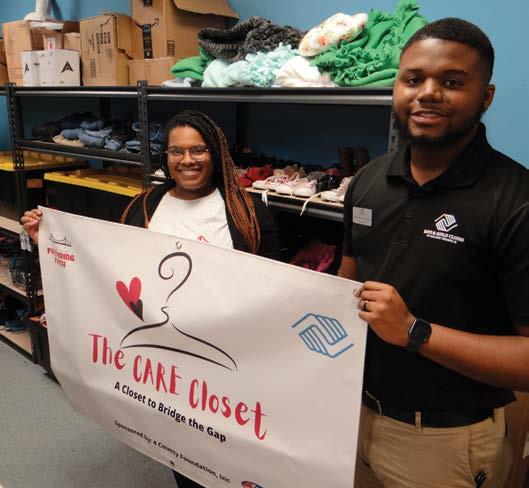
The CARE Closet contains everyday necessities and supplies that children and families in need can apply for via a Closet Request Form. “With our grant from the 4-County Foundation, we were able to purchase shelves, totes, and other items for our closet. This grant means a lot to Fostering Faith because we were able to make our CARE Closet functional. Thank You, 4-County Foundation,” said Fostering Faith Founder Keltra Chandler.
4-County believes in helping the communities it serves. That’s why the cooperative launched the 4-County Foundation, a community service program. Since February 2015, participating 4-County members’ utility bills have been rounded up to the nearest dollar; a $125.78 bill, for example, becomes $126. Now, that’s an average of only 49 cents per member, per month. That may not seem like much. But when you multiply those contributions by the thousands of member participants, that’s a lot of pennies!
For more information on the 4-County Foundation, call 1-800-431-1544.

The 4-County Foundation has met twice since October 2022 and made over $94,000 in awards to 13 area non-profit organizations.
Those receiving the recent round of awards include: American Legion Post 82 ($7,500 for building renovations); Chickasaw County Board of Supervisors ($5,500 for first responder equipment); Choctaw County High School ($7,185 for start-up of Robotics Team program); Columbus YMCA ($3,000 for Parkinson’s/ Adaptive Therapy equipment); French Camp Observatory ($4,800 for 12 public education planetarium programs); Junior Auxiliary of Starkville ($8,000 for food pantry support); The Mission ($10,000 for security cameras in housing areas); the Noxubee County Historical Society ($10,000 for museum maintenance); Choctaw County Board of Supervisors ($9,202 for volunteer fire department equipment); Starkville Kiwanis Club ($5,000 for food pantry items); Town of Artesia ($10,000 for radio equipment for the town Marshal’s department); Starkville Academy ($9,958 for equipment supporting the school’s Robotics Team); and Choctaw County Schools ($4,000 for AEDs for Weir Elementary School).
4-County believes in helping the communities it serves. That’s why the cooperative launched the 4-County Foundation, a community service program. Since its inception, 4-County members’ utility bills have been rounded up to the nearest dollar; a $125.79 bill, for example, becomes $126. Now, at the most that’s around a little less than an extra $12 per year per member (an average of about $5.50 per year per member). However, when you multiply those contributions by thousands of member participants, that change becomes real dollars of hope and assistance for those worthy Foundation recipients.
4-County Foundation Board members, individuals selected from throughout the cooperative service area, decide and handle fund requests.
Applications to receive Foundation assistance for individuals and organizations are available in 4-County o ces and on the 4-County website, www.4county.org. You can also call 1-800-431-1544 for more information. Ninety-three percent of 4-County members participate.
Crews from 4-County Electric Power Association recently assisted Northcentral Electric Power Association in outage restoration e orts associated with Winter Storm Mara.

The crews (an all-volunteer group) left Columbus Feb. 2 and spent a few days at Northcentral Electric, a co-op serving about 35,000 members in areas around Byhalia and Olive Branch.
At the height of storm restoration, Northcentral had about 1,500 members without power in the wake of Winter Storm Mara’s icy conditions.
In addition to the crews, 4-County sent several large pieces of equipment to assist in the recovery process, including bucket trucks, digger-derrick trucks, and service/pickup trucks.
4-County and other cooperatives around the state and nation operate under a reciprocal agreement to provide help to each other in times of crisis.
4-County employees working in north central Mississippi included: Tim Adkins of Columbus, Derek Dawkins of Macon, Tim Hardy of Scooba, Brandon Worrell of Starkville, Corey Kilgore of Caledonia, Eric Yarbrough of Columbus, Curtis Collier of French Camp, Tyler Smith of Starkville, Justin Davis of Columbus, Tony Glenn of Macon, Allen Baty of Hamilton, and Drew Williamson of Columbus.
“We are glad to be in a position to send this assistance to help restore power to members of Northcentral Electric,” said 4-County Manager of Operations Anthony Miller. “Our system and members have been the recipients of assistance from other electric cooperatives, and we are always glad to be able to help others when they need assistance. That’s the cooperative way.”

4-County Electric Power Association members have a new way to manage their cooperative electric accounts.
The new and improved 4-County Member Portal is live and ready to use, according to cooperative o cials.
4-County members can access the online site directly by going to my4county.org or they can go to 4county.org and click the My Portal link.
Just have your account number ready, create a user ID, and a password, and you have access to all things associated with a 4-County member account and a few extra tidbits of information. The extras include information on 4-County corporate events like the Annual Member Meeting, access to members-only documents, and a look at the latest 4-County board of directors’ minutes.
“This is just another convenient way for members to manage their accounts,” said P.J. Hughes, 4-County information technology administrator. “We’re really excited about this new o ering. It’s really convenient and e cient portal for our members. And they can also learn a little more about the cooperative and its services.”
The portal – complete with a fresh, modern look – is user friendly and accessible through multiple devices, Hughes said. “We’ll continue to look for ways to enhance service to our members,” he added.
For more information on the member portal and other co-op services, call 1-800-431-1544.
Ryan Lloyd of Columbus has recently joined the 4-County Electric Power Association/FASTnet team. Lloyd will serve as GIS Analyst for FASTnet. Prior to 4-County, Lloyd worked for Atmos Energy as a senior construction operator. He is an Air Force veteran, and he is currently studying business management at Mississippi University for Women.
He and his wife, Sarah, live in Columbus with their 10-month-old daughter, Charlotte.
Ryan is a Volunteer Firefighter for Lowndes County District 3, and he is a member of the Lowndes County Search and Rescue Team.
In his spare time, he enjoys spending time with family, traveling, hiking, and playing guitar.
Welcome to the FASTnet team, Ryan!







A tradition of dependable, hometown service since 1937
CARTHAGE: 601-267-5671 | PHILADELPHIA: 601-656-2601 | RANKIN: 601-829-1201 | SEBASTOPOL: 601-625-7422





 by Abby Berry
by Abby Berry
Storm season is upon us, which means greater potential for power outages. If you’re planning to use a portable generator in the event of an outage, your electric co-op reminds you to play it safe.
With proper use and maintenance, portable generators can provide great convenience during an outage. However, when generators are used incorrectly, they can be extremely hazardous. In a 2022 report, the Consumer Product Safety Commission estimated 85 U.S. consumers die every year from carbon monoxide (CO) poisoning caused by gasolinepowered portable generators.
Install backup CO alarms. Keep children and pets away from portable generators at all times.

Position generators at least 25 feet outside the home, away from doors, windows, and vents that can allow CO to enter the home.

Ensure your generator is properly grounded. Use a portable ground fault circuit interrupter (GFCI) to prevent electric shock injuries.
Use three-pronged extension cords that are rated to handle the load of the generator. Inspect extension cords for cuts, frays, or other damage before use.
Operate a generator inside your home or an enclosed (or partially-enclosed) space. Generators produce high levels of CO, which can be deadly.
Rely on generators as a full-time source of power. They should only be used temporarily or in emergency situations to power essential equipment or appliances.
Open windows or doors while the generator is running.
Overload generators. They should only be used to power essential equipment. Make sure your generator can handle the load of the items you plan to power.
Connect generators directly into household wiring unless you have an appropriate transfer switch installed. If a generator is connected to a home’s wiring without a transfer switch, power can backfeed along power lines and electrocute utility lineworkers making repairs.
While generators provide convenience during power outages, they can quickly become hazardous – even deadly – if improperly operated. Before you operate a portable generator, be sure to thoroughly read the owner’s manual for important safety information and tips.
Abby Berry writes on consumer and cooperative a airs for the National Rural Electric Cooperative Association.
Central Electric Power Association will hold its 86th Annual Meeting of the Membership on March 21 at the Carthage Coliseum on Highway 16 East in Carthage. Registration will open at 9 a.m. and will close at 10 a.m.
At the meeting, three directors will be elected for three-year terms. Members will elect two directors from Leake County and one director from Attala County. There also will be reports given on the operation of the association for the past year, and other matters of business will be conducted.
The Nominating Committee for 2023 consists of Doug Powers from Leake County, Billy Cook from Leake County, and Howard Holder from Attala County.
Candidates nominated by the Nominating Committee for election to the board are Danny Thornton (4239 Ebenezer Road, Carthage, MS 39051) from Leake County; Mike Brooks (3377 Freeny Road, Carthage, MS 39051) from Leake County; and Earl Browning (4873 Attala Road 3024, Kosciusko, MS 39090) from Attala County.
Candidates nominated by petition for election to the board are Allen Peoples (1029 Wright Road, Carthage, MS 39051) from Leake County and Brian Robinson (210 Alford Road, Carthage, MS 39051) from Leake County.
Central Electric, with the cooperation of Sta-Home Health Agency in Carthage, will provide a health fair at the annual meeting. Nurses will o er free blood pressure screenings. Services provided at the health fair will begin at 9 a.m. and continue until 10:20 a.m., when the business meeting begins. Bros. 4 Quartet will provide musical entertainment before the meeting.
Each Central Electric member who registers at the annual meeting will receive a free light bulb and will be eligible to win one of the following prizes: a slow cooker, co ee maker, clock/radio, electric skillet, electric can opener, toaster, co ee percolator, iron, or electric clock. The grand prize for members who are present at the meeting will be an electric smoker.
Central Electric will give away a special prize this year for any member who registers in person at the meeting or who sends in his or her proxy or ballot. Four lucky winners will win one of four electricity bill credit prizes: three winners will receive a $500 credit each and one lucky winner will receive a $1,500 credit.
Remember, mail in your proxy or ballot for this year’s meeting. You do not have to be present to win. If your name is drawn at the annual meeting, we will notify you.
Central Electric is a not-for-profit, member-owned cooperative based in Carthage with branch o ces in Philadelphia, Sebastopol, and Rankin County. The co-op maintains more than 4,000 miles of distribution line and serves more than 36,000 member-owners in central Mississippi. Central Electric’s service area includes parts of Leake, Neshoba, Attala, Scott, Newton, Rankin, and Kemper counties.
The bylaws of the association provide that any person, fi rm, or corporation may become a member of Central Electric by making a written application, paying the membership fee, purchasing electricity from the co-op, and abiding by the rules and regulations as prescribed by the board of directors.
Central Electric’s annual meeting is for you, the member-owner. So mark your calendar for March 21, and we’ll see you at the annual meeting!
SPECIAL PRIZE: electricity bill credits

Four lucky winners will win one of four special electricity bill credit prizes:
• THREE WINNERS will receive $500 CREDIT each and

• ONE LUCKY WINNER will receive a $1,500 CREDIT.
GRAND PRIZE: electric smoker
OTHER PRIZES: slow cooker, co ee maker, clock/radio, electric skillet, electric can opener, toaster, co ee percolator, iron, or electric clock.

Call to Order, Brian Long, General Manager; Invocation; Welcome, Mayor Laurie Henderson; Report of Manager, Brian Long; Engineering and Operations Report; Awarding of Door Prizes; Transaction of Business; Election of Directors; Awarding of Door Prizes
Pursuant to Article III, Sections 3.01 and 3.03, of the association bylaws, notice is hereby given that the annual meeting of members of Central Electric Power Association will be held in the Carthage Coliseum, Highway 16 East, on Tuesday, March 21, 2023. Registration will open at 9 a.m. and will close at 10 a.m.
In accordance with the laws of Mississippi and the bylaws of the association, members will elect three directors for three-year terms: two directors from Leake County and one director from Attala County. Reports will be given on the operation of the association for the past year, and other matters of business will be conducted.
If you cannot attend, please mail in your ballot or proxy.
Each member who attends will receive a free light bulb. Many other valuable door prizes will be given away by drawing names from those registered. Please try to attend.
This year, six names will be drawn from the mail-in votes and prizes will be awarded to them.
Danny Thornton, Secretary
This institution is an equal opportunity provider and employer.
This institution is an equal opportunity provider and employer. If you wish to file a Civil Rights Program complaint of discrimination, complete the USDA Program Discrimination Complaint Form, found online at ascr.usda.gov/complaint_ filing_cust.html or at any USDA office, or call (866) 632-9992 to request the form. You may also write a letter containing all the information requested in the form. Send your completed complaint form or letter to us by mail at U.S. Department of Agriculture, Director, Office of Adjudication, 1400 Independence Avenue, S.W., Washington, D.C. 20250-9410, by fax (202) 690-7442 or by email at program.intake@usda.gov.
QI’m looking for options to replace my old water heater. What should I choose to make my home’s water heating more e cient and save money?


By moving heat instead of creating it, a heat pump water heater uses 60% less energy than electric storage water heaters. That can add up to hundreds of dollars a year and thousands during the life of the water heater.
Improved controls make it easy to set the desired temperature and programming, including vacation mode, which saves energy when you are out of town.
Some models o er Wi-Fi connectivity to be controlled by a smartphone from anywhere. Other helpful features include leak detection and automatic shuto .




A heat pump water heater uses heat from a room to heat water. It tends to make the space about 2 degrees cooler, which is something to consider before installation. Ideal placement is an unconditioned space, such as a garage or unheated basement. A heat pump water heater requires enough space around the unit to supply the air needed for e cient operation — about 750 cubic feet.
Heat pump water heaters tend to be slightly taller than storage water heaters and require additional clearance above the unit to access the filter for cleaning. If your water heater is in a conditioned space or a room smaller than the unit requires, venting might be a solution for your installation.
Another consideration is noise. A heat pump water heater generates about as much noise as a modern dishwasher, so it may not be a good solution if the water heater is located where sound could be a nuisance.
Installing a heat pump water heater is much like installing a standard electric water heater, except for the location of the cold-water inlet, which is located at the bottom of the unit.
Because moisture in the air condenses when it is drawn through the heat pump, it also requires a condensate drain that must be routed to a drain or pumped outside of the home.




Heat pump water heaters can replace electric, gas, or propane water heaters. They typically require a 240-volt circuit, which might necessitate an electrical upgrade by a licensed electrician.
AConsider upgrading to an energy e cient heat pump water heater. Heat pump water heaters — also called hybrid water heaters — use heat pump technology to heat water more e ciently than a standard electric storage water heater. Think of them as a standard water heater with a heat pump on top. The heat pump heats the water two to three times more e ciently than the electric elements, but the unit still has the electric elements as backup, if needed.


The life expectancy of a standard water heater is about 10 years. If your water heater is older than that or showing signs of failing, you may want to consider replacing it with a heat pump water heater before it fails.
It’s easier to find the product you want when it is not an emergency replacement. It also can be more expensive to replace it during an emergency. While heat pump water heaters are sold at a higher price than standard water heaters, the cost savings over time can o set the purchase and installation cost––and will result in a more energy e cient home.
You also are likely to save by taking advantage of sales, rebates, or tax credits. Check with your electric utility, state department of energy and federal tax information before purchasing a new water heater.

Miranda Boutelle is the chief operating o cer at E ciency Services Group in Oregon, a cooperatively owned energy e ciency company.

Here are some details about their e ciency, how the units operate, installation considerations, and when you should replace your old water heater.







When Winter Storm Mara roared through Mississippi on Feb. 2, about 2,600 members of Coahoma Electric lost power.












Five other state electric co-ops — Delta Electric, Yazoo Valley, Tishomingo, Alcorn County, and Southern Pine — responded to the call to assist Coahoma restore power.





Thank you to all the teams for their dedication and hard work to help Coahoma during the aftermath of the storm!



The Chamber is excited to announce, the first annual Dash Down Delta 5K run + walk. It will be held on March 25th and start/finish downtown in front of the Chamber office. I have attached an entry form below (Click the image of runners). Entry forms can be turned in to the Chamber of Commers office (102 3rd Street). We hope everyone can attend. If you have any questions, please call the Chamber office at 662.627.7337.











By moving heat instead of creating it, a heat pump water heater uses 60% less energy than electric storage water heaters. That can add up to hundreds of dollars a year and thousands during the life of the water heater. Improved controls make it easy to set the desired temperature and programming, including vacation mode, which saves energy when you are out of town.
Some models o er Wi-Fi connectivity to be controlled by a smartphone from anywhere. Other helpful features include leak detection and automatic shuto .

Consider upgrading to an energy e cient heat pump water heater. Heat pump water heaters — also called hybrid water heaters — use heat pump technology to heat water more e ciently than a standard electric storage water heater. Think of them as a standard water heater with a heat pump on top. The heat pump heats the water two to three times more e ciently than the electric elements, but the unit still has the electric elements as backup, if needed.




A heat pump water heater uses heat from a room to heat water. It tends to make the space about 2 degrees cooler, which is something to consider before installation. Ideal placement is an unconditioned space, such as a garage or unheated basement. A heat pump water heater requires enough space around the unit to supply the air needed for e cient operation — about 750 cubic feet.
Heat pump water heaters tend to be slightly taller than storage water heaters and require additional clearance above the unit to access the filter for cleaning. If your water heater is in a conditioned space or a room smaller than the unit requires, venting might be a solution for your installation. Another consideration is noise. A heat pump water heater generates about as much noise as a modern dishwasher, so it may not be a good solution if the water heater is located where sound could be a nuisance. Installing a heat pump water heater is much like installing a standard electric water heater, except for the location of the cold-water inlet, which is located at the bottom of the unit.
Because moisture in the air condenses when it is drawn through the heat pump, it also requires a condensate drain that must be routed to a drain or pumped outside of the home.







Heat pump water heaters can replace electric, gas, or propane water heaters. They typically require a 240-volt circuit, which might necessitate an electrical upgrade by a licensed electrician.


QI’m looking for options to replace my old water heater. What should I choose to make my home’s water heating more e cient and save money?Heat pump water heaters make it easy to set the desired temperature and programming, including vacation mode, which saves energy when you are out of town. Photo Credit: Hot Water Solutions
Here are some details about their e ciency, how the units operate, installation considerations, and when you should replace your old water heater.



The life expectancy of a standard water heater is about 10 years. If your water heater is older than that or showing signs of failing, you may want to consider replacing it with a heat pump water heater before it fails.

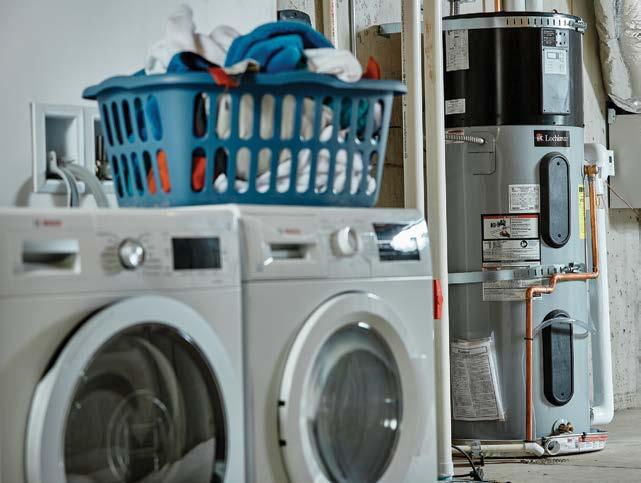
It’s easier to find the product you want when it is not an emergency replacement. It also can be more expensive to replace it during an emergency. While heat pump water heaters are sold at a higher price than standard water heaters, the cost savings over time can o set the purchase and installation cost — and will result in a more energy e cient home. You also are likely to save by taking advantage of sales, rebates, or tax credits. Check with your electric utility, state department of energy and federal tax information before purchasing a new water heater.
I installed a heat pump water heater in my home. I love it and can see how my energy use has decreased since installation. Now, if I can only figure out how to get my children to take shorter showers.
 Ideal placement of a heat pump water heater is in an unconditioned space, such as a garage or unheated basement. Photo Credit: Hot Water Solutions
Miranda Boutelle is the chief operating o cer at E ciency Services Group in Oregon, a cooperatively owned energy e ciency company.
By moving heat instead of creating it, a heat pump water heater uses 60% less energy than electric storage water heaters.
Photo Credit: Hot Water Solutions
Ideal placement of a heat pump water heater is in an unconditioned space, such as a garage or unheated basement. Photo Credit: Hot Water Solutions
Miranda Boutelle is the chief operating o cer at E ciency Services Group in Oregon, a cooperatively owned energy e ciency company.
By moving heat instead of creating it, a heat pump water heater uses 60% less energy than electric storage water heaters.
Photo Credit: Hot Water Solutions



 by Abby Berry
by Abby Berry

There are a number of reasons why people are interested in cutting back on energy consumption — some are primarily motivated to save on their monthly energy bills while others may be more concerned about reducing their personal carbon footprint.

Actively practicing energy e ciency and conservation provides multiple benefits. For parents, being more conscious about energy use can be used as a tool to teach kiddos about sustainable habits for the future; conserving energy also means fewer carbon emissions, which results in better air quality and a healthier environment; and I think we can all agree that saving money on our monthly utility bills is a great reason to monitor home energy use.
Regardless of why you’re interested in using less energy, there are several smart phone apps that can help you do just that!









I know what you’re thinking, and yes — to use a smart thermostat app, you must purchase a smart thermostat. But heating and cooling make up a large portion of the average home’s energy consumption (and cost!), so saving on heating and cooling can make a big impact on bills. Smart thermostats and their accompanying apps are handy and promote energy ecient behavior–and these devices have become much more a ordable over the years. You can purchase an ENERGY STAR®-certified smart thermostat for as low as $100, which can save you 8% on annual heating and cooling costs, about $50 per year. The device will quickly pay for itself, and you’ll gain insight into better ways to heat and cool your home. Plus, the ability to control the thermostat from anywhere can equate to real savings. We recommend trusted brands and devices, like Google’s Nest Learning Thermostat and Ecobee’s Smart Thermostat.













If you’re wanting to reduce energy use at home, it’s important to know where your consumption is going. Energy cost calculators can help pinpoint your energy use with a few simple steps and identify areas to save. The concept is pretty simple; just plug in the wattage of your various appliances and how often you use them to see which are using the most energy. Most energy cost calculator apps are free and can be downloaded to any Apple or Android device. If you browse the app store, you’ll find multiple energy cost calculator apps, but most are similar in functionality. Be sure to read the app’s reviews and download the one that best aligns with your energy e ciency goals.
If you’re competitive and enjoy gamifying — well, everything — the JouleBug app is right up your alley. JouleBug makes energy conservation simple and fun through personal tasks and badges earned within the app, group challenges you can tackle with friends, and communities you can join to learn about local sustainability e orts. The JouleBug app is free and can be downloaded to Apple or Android devices, and it’s an easy tool to make saving energy fun.
These are just a few apps that can help you find new ways to save energy. Smart light bulbs are typically paired with apps for convenient control of home lighting; smart plugs also come with apps to help you control how you power everyday devices and electronics. Whether you use an app or not, saving energy is always a smart idea that can help you save money on your monthly bills and reduce your carbon footprint.
Abby Berry writes on consumer and cooperative a airs for the National Rural Electric Cooperative Association. Energy cost calculator apps can help pinpoint your energy use with a few simple steps and identify areas to save. A smart thermostat paired with a smart phone app can help you manage energy used to heat or cool your home, which can help you save energy and money.

Cooperatives are a little di erent than most businesses. Because we operate as a not-for-profit company, owned by the people we serve, we put our focus on serving our consumers and our communities. Everything we do centers around the homes and businesses that receive electric and broadband service from us, and our team works to ensure that every project, every program, is beneficial to our members. To stay on track, we do a few things. For example, our board of directors and our advisory committee are made up of your fellow members. We host meetings and events for members to make sure you are an active part of our cooperative. And we conduct surveys – lots of surveys! We know that feedback from members is crucial to the success of our company and for our community.
Each year, the National Rural Electric Cooperative Association conducts a scientific survey of our members to determine the areas you are most satisfied with and those areas where you would like to see improvements. We learn a lot from our survey results, and, among the findings, we receive




a score on the American Customer Satisfaction Index. This year, Coast Electric received a score of 89, putting your electric cooperative among some of the best electric service providers nationwide.
We are proud of our 89, but we know there are opportunities to improve our service. We will use these results, as well as information from our regular quality monitoring surveys and any other feedback you give us to ensure we are providing the highest level of service. Your opinion matters to us. I am always listening.
by Ron Barnes President and CEO
among CEPA’s residential members is excellent.
77%




of members gave us a TOP RATING of 9 10 or




Members were asked to evaluate 17 PERFORMANCE QUALITY ATTRIBUTES related to member service, electric service, communication, billing and cost.
ALL WERE RATED
ABOVE 4.48
on a 5-point scale while having friendly, courteous employees remains the HIGHEST RATED ATTRIBUTE.
Coast Electric wants you to reduce your energy use and see savings on your energy costs. Each month, you will have an opportunity to register to win a prize that will help you reduce the energy consumption in your home. Visit www.coastepa.com and fill out our entry form. It only takes a few seconds, and you could win a prize that helps you save!
Congratulations to Nathaniel Blosser, the winner of our January Reduce Your Use prize!
Our Time of Use (TOU) rate spring/summer peak hours begin April 3. If you are a member who is taking advantage of this energy and money-saving rate plan, be sure to change the settings on your water heater timers, pool pump timers, and programmable thermostats to reflect the summer peak hours –3 p.m. - 6 p.m., Monday through Friday.
If you have not taken advantage of our TOU rate plan, what are you waiting for? The plan comes with a six-month guarantee, so if you don’t save, you haven’t lost a penny. That’s a great deal! Visit www.coastepa.com or give us a call at 877-769-2372 to learn more about how you can save with TOU.

Don’t forget to spring forward! Daylight Saving Time begins at 2 a.m. on March 12. If you are on our TOU rate and your timers don’t automatically reset, remember to change them to ensure savings.




We are so LUCKY to serve our Coast Electric members and to connect them with CoastConnect! Join us in Diamondhead this St. Patrick’s Day to learn more about the advantages of high-speed internet service from a local company with CoastConnect, and to talk to Coast Electric’s energy experts about ways to save!
WHAT: Coast Electric Energy Fair and CoastConnect Sign-up Event
WHEN: Friday, March 17 from 10 a.m.- 2 p.m.

WHERE: Diamondhead Community Center
ENJOY: Giveaways and prizes! FREE lunch for the first 50 attendees!

Charitable organizations that serve Hanco Harrison or Pearl River counties could be eligible for a grant of up to $10,000!
OUR
table organizations that serve Hancock, rison or Pearl River counties could be eligible for a grant of up to $10,000!
ce 2019, Operation Round Up has given more than $1 million in grants thanks to enerosity of our members. We thank you upporting your local community and we xcited to share that grant applications available for the month of February.
Members like you generously contribute to our Operation Round Up program, funding grants for charitable organizations in Hancock, Harrison, and Pearl River counties. Because of your belief in this program, Operation Round Up grants have fed the hungry, helped job seekers, provided resources for foster families, helped seniors receive life-saving medications, and so much more. Your spare change has made a big di erence in our community.
Since 2019, Operation Round Up has give back more than $1 million in grants thanks the generosity of our members. We thank y for supporting your local community and w are excited to share that grant applicatio are available for the month of February.
Our Operation Round Up relies on the support of our members and community partners. We believe that if you contribute to Operation Round Up, it is our responsibility to take care of your investment.

One of the ways we ensure your contributions are used to fulfill needs in our community is by partnering with the Gulf Coast Community Foundation (GCCF). The GCCF processes grant applications and sta spend time vetting the applications and organizations that apply to ensure funds will be used for approved activities and items, and that the organization has a documented history of financial and program success. After a thorough review, GCCF sta provide recommendations about which grants should be funded with Operation Round Up donations.
After the GCCF makes their recommendations, we take one more step before funding grants. Our Community Trust Committee, made up of nine Coast Electric members — three from each of the counties we serve — reviews grant applications recommended by the GCCF and makes final decisions about which projects should be supported by Operation Round Up. These committee members are our eyes and ears in the community and help guide our program so that we are funding grants that make lasting positive impacts in our local community.
We recently welcomed a new committee. Each member will serve three consecutive one-year terms. We look forward to working with these men and women and making a continued positive di erence in our community with Operation Round Up!
Hancock County
Blake Travis
Ronnie Breland
Duane Wilson
Harrison County
Fred Ho
Valerie Underwood
Padrick Dennis
Pearl River County
Candace Harper
Caleb Smith
Cody Cuevas
contact Janell Nolan, Director of Community Development at roundup@coastepa.com or 228-363-7259.


Coast Electric and our high-speed internet subsidiary CoastConnect are known for being outstanding places to work. Besides having great benefits and competitive salaries, there is a team atmosphere that rewards hard work and encourages making our community a better place to live, work, and play.
Coast Electric employs more than 250 highly skilled employees in fields like engineering, member services, accounting, human resources, communications, IT, GIS and, of course, operations.
It’s an exciting time to be part of CoastConnect as well! Employees of CoastConnect are building a new, locally owned and operated company that brings high-speed internet service to our community.

The people working for CoastConnect are building something that will be an integral part of our community for generations to come.
If you are interested in a career in an exciting industry with a great work environment, visit www.coastepa.com/my-co-op or www.coastconnect.com. You will find links to sign up for job alerts and browse available jobs.


When you are part of a cooperative, you’re part of something bigger than yourself – you are part of an organization that puts people first. If you’re looking for a career you can be proud of, careers at Coast Electric and CoastConnect help you build a lasting legacy in our community.
In accordance with Federal civil rights law and U. S. Department of Agriculture (USDA) civil rights regulations and policies, the USDA, its Agencies, offices and employees, and institutions participating in or administering USDA programs are prohibited from discriminating based on race, color, national origin, religion, sex, gender identity (including gender expression), sexual orientation, disability, age, marital status, family/parental status, income derived from a public assistance program, political beliefs, or reprisal or retaliation for prior civil rights activity, in any program or activity conducted or funded by USDA (not all bases apply to all programs). Remedies and compliant filing deadlines vary by program or incident.
Persons with disabilities who require alternative means of communication for program information (e.g., Braille, large print, audiotape, American Sign Language, etc.) should contact the responsible agency or USDA’s TARGET Center at (202) 720-2600 (voice and TTY) or contact USDA through the Federal Relay Service at (800) 877-8339. Additionally, program information may be made available in languages other than English.
To file a program discrimination complaint, complete the USDA Program Discrimination Complaint Form, AD-3027, found online at http:// www.ascr.usda.gov/complaint_filing_cust.html and at any USDA office or write a letter addressed

to USDA and provide in the letter all of the information requested in the form. To request a copy of the complaint form, call (866) 632-9992. Submit your completed form or letter to USDA by:
Mail: S. Department of Agriculture
Office of the Assistant Secretary for Civil Rights 1400 Independence Avenue, SW Washington, D.C. 20250-9410; Fax: (202) 690-7442; or
Email: intake@usda.gov
USDA is an equal opportunity provider, employer, and lender.















TUESDAY, APRIL 11, 2023 • 10 A.M. Greenwood Elks Lodge 1010 Sgt. John Pittman Drive, Greenwood, MS
All members of Delta Electric Power Association are urged to attend the Annual Meeting of Members on Tuesday, April 11, 2023. Registration will begin at 9:30 a.m. with the meeting to follow at 10 a.m., at the Greenwood Elks Lodge on 1010 Sgt. John Pittman Drive, Greenwood.







Participation of Delta EPA members in the annual meeting is important to elect directors, receive and pass on reports covering the operation of the association and to transact other business that may come before the meeting. With a few exceptions provided by the bylaws, only members will be admitted to the meeting. Seating, however, will be available for members’ families who wish to attend.
It is important to the successful operation of the association that its members either attend this meeting in person or sign, date, and send in the original proxy form that was mailed January 6 to each member. The proxy must be executed and mailed in or delivered in person to the secretary of the association at the association’s o ce at 1700 Highway 82 West in Greenwood.
The proxy must be received by the secretary of the association no later than April 6, 2023, to be valid. Members must vote on the original printed forms; copies will not be accepted. Any member who has misplaced the original proxy may request another by calling the nearest Delta Electric Power Association o ce. Under the bylaws of the association, each member is entitled to one vote.



By moving heat instead of creating it, a heat pump water heater uses 60% less energy than electric storage water heaters. That can add up to hundreds of dollars a year and thousands during the life of the water heater. Improved controls make it easy to set the desired temperature and programming, including vacation mode, which saves energy when you are out of town.
Some models o er Wi-Fi connectivity to be controlled by a smartphone from anywhere. Other helpful features include leak detection and automatic shuto .

Consider upgrading to an energy e cient heat pump water heater. Heat pump water heaters — also called hybrid water heaters — use heat pump technology to heat water more e ciently than a standard electric storage water heater. Think of them as a standard water heater with a heat pump on top. The heat pump heats the water two to three times more e ciently than the electric elements, but the unit still has the electric elements as backup, if needed.




A heat pump water heater uses heat from a room to heat water. It tends to make the space about 2 degrees cooler, which is something to consider before installation. Ideal placement is an unconditioned space, such as a garage or unheated basement. A heat pump water heater requires enough space around the unit to supply the air needed for e cient operation — about 750 cubic feet.
Heat pump water heaters tend to be slightly taller than storage water heaters and require additional clearance above the unit to access the filter for cleaning. If your water heater is in a conditioned space or a room smaller than the unit requires, venting might be a solution for your installation. Another consideration is noise. A heat pump water heater generates about as much noise as a modern dishwasher, so it may not be a good solution if the water heater is located where sound could be a nuisance. Installing a heat pump water heater is much like installing a standard electric water heater, except for the location of the cold-water inlet, which is located at the bottom of the unit.
Because moisture in the air condenses when it is drawn through the heat pump, it also requires a condensate drain that must be routed to a drain or pumped outside of the home.







Heat pump water heaters can replace electric, gas, or propane water heaters. They typically require a 240-volt circuit, which might necessitate an electrical upgrade by a licensed electrician.


QI’m looking for options to replace my old water heater. What should I choose to make my home’s water heating more e cient and save money?Heat pump water heaters make it easy to set the desired temperature and programming, including vacation mode, which saves energy when you are out of town. Photo Credit: Hot Water Solutions
Here are some details about their e ciency, how the units operate, installation considerations, and when you should replace your old water heater.



The life expectancy of a standard water heater is about 10 years. If your water heater is older than that or showing signs of failing, you may want to consider replacing it with a heat pump water heater before it fails.


It’s easier to find the product you want when it is not an emergency replacement. It also can be more expensive to replace it during an emergency. While heat pump water heaters are sold at a higher price than standard water heaters, the cost savings over time can o set the purchase and installation cost — and will result in a more energy e cient home. You also are likely to save by taking advantage of sales, rebates, or tax credits. Check with your electric utility, state department of energy and federal tax information before purchasing a new water heater.
I installed a heat pump water heater in my home. I love it and can see how my energy use has decreased since installation. Now, if I can only figure out how to get my children to take shorter showers.
 Ideal placement of a heat pump water heater is in an unconditioned space, such as a garage or unheated basement. Photo Credit: Hot Water Solutions
Miranda Boutelle is the chief operating o cer at E ciency Services Group in Oregon, a cooperatively owned energy e ciency company.
By moving heat instead of creating it, a heat pump water heater uses 60% less energy than electric storage water heaters.
Photo Credit: Hot Water Solutions
Ideal placement of a heat pump water heater is in an unconditioned space, such as a garage or unheated basement. Photo Credit: Hot Water Solutions
Miranda Boutelle is the chief operating o cer at E ciency Services Group in Oregon, a cooperatively owned energy e ciency company.
By moving heat instead of creating it, a heat pump water heater uses 60% less energy than electric storage water heaters.
Photo Credit: Hot Water Solutions



 by Abby Berry
by Abby Berry

There are a number of reasons why people are interested in cutting back on energy consumption — some are primarily motivated to save on their monthly energy bills while others may be more concerned about reducing their personal carbon footprint.

Actively practicing energy e ciency and conservation provides multiple benefits. For parents, being more conscious about energy use can be used as a tool to teach kiddos about sustainable habits for the future; conserving energy also means fewer carbon emissions, which results in better air quality and a healthier environment; and I think we can all agree that saving money on our monthly utility bills is a great reason to monitor home energy use.
Regardless of why you’re interested in using less energy, there are several smart phone apps that can help you do just that!









I know what you’re thinking, and yes — to use a smart thermostat app, you must purchase a smart thermostat. But heating and cooling make up a large portion of the average home’s energy consumption (and cost!), so saving on heating and cooling can make a big impact on bills. Smart thermostats and their accompanying apps are handy and promote energy ecient behavior–and these devices have become much more a ordable over the years. You can purchase an ENERGY STAR®-certified smart thermostat for as low as $100, which can save you 8% on annual heating and cooling costs, about $50 per year. The device will quickly pay for itself, and you’ll gain insight into better ways to heat and cool your home. Plus, the ability to control the thermostat from anywhere can equate to real savings. We recommend trusted brands and devices, like Google’s Nest Learning Thermostat and Ecobee’s Smart Thermostat.













If you’re wanting to reduce energy use at home, it’s important to know where your consumption is going. Energy cost calculators can help pinpoint your energy use with a few simple steps and identify areas to save. The concept is pretty simple; just plug in the wattage of your various appliances and how often you use them to see which are using the most energy. Most energy cost calculator apps are free and can be downloaded to any Apple or Android device. If you browse the app store, you’ll find multiple energy cost calculator apps, but most are similar in functionality. Be sure to read the app’s reviews and download the one that best aligns with your energy e ciency goals.
If you’re competitive and enjoy gamifying — well, everything — the JouleBug app is right up your alley. JouleBug makes energy conservation simple and fun through personal tasks and badges earned within the app, group challenges you can tackle with friends, and communities you can join to learn about local sustainability e orts. The JouleBug app is free and can be downloaded to Apple or Android devices, and it’s an easy tool to make saving energy fun.
These are just a few apps that can help you find new ways to save energy. Smart light bulbs are typically paired with apps for convenient control of home lighting; smart plugs also come with apps to help you control how you power everyday devices and electronics. Whether you use an app or not, saving energy is always a smart idea that can help you save money on your monthly bills and reduce your carbon footprint.
Abby Berry writes on consumer and cooperative a airs for the National Rural Electric Cooperative Association. Energy cost calculator apps can help pinpoint your energy use with a few simple steps and identify areas to save. A smart thermostat paired with a smart phone app can help you manage energy used to heat or cool your home, which can help you save energy and money.









As the calendar turns to March, spring is on the horizon. Although, if you’ve lived in south Mississippi long enough, you know that it’s not unusual for us to experience all four seasons within one month. Spring usually means milder temperatures, and with it, lower power bills. But have you ever wondered why that is? Let’s take a minute to talk about how the weather directly impacts the amount of your power bill, especially during extreme temperatures.
The below-freezing arctic weather we experienced during the Christmas holidays caused a spike in energy use across the country and for Dixie Electric members as well, meaning many members received higher bills than normal. Additionally, we’ve experienced many nights where the temperature remained in the 30–40-degree range.
Our heating and cooling units are the biggest energy users in our homes. During those below-freezing days and nights, your heating systems worked overtime to make up the di erence between the outside temperature and the inside setting. Even if you kept your thermostat set at the recommended temperature and never touched it, your unit worked harder and longer and used more energy in the process. Also, many heating units operated on emergency heat during the extreme cold weather, a setting that switches the source of your heat from the heat pump to electric heat strips, which uses significantly more electricity than heat pumps alone. By the way, you may want to ensure your heat is no longer running on the emergency heat setting, as some units must be manually switched back.
In addition to heating your home, water heating during freezing weather will also cause you to see an increase in your bill. Water
heaters, which store hot water until it’s ready to be used, also work overtime as heat is consistently lost to the environment. When the water cools down, the heating unit turns on, using more power to constantly reheat the water.
To better see how the weather directly impacts your energy use, I encourage you to download the SmartHub app or create an account at dixieepa.com. Inside your account, you can see your daily energy use and the weather for that day. You will be able to see the spikes in your use when the temperatures are extreme and notice when they are lower during more moderate weather. These tools will help you realize where your energy dollars are going. If you need help setting up the SmartHub app, give us a call.


At Dixie Electric, our goal is to be your trusted source for advice about energy use in your home or business. We aren’t quite like other utilities because our business model is di erent. Cooperatives like ours are notfor-profit organizations, meaning we don’t focus on profits; we focus on the people we serve. If you have questions concerning your bill, we have a great team of energy advisors here to help you.



Dixie Electric Power Association has completed a rate study and will implement new rates e ective April 2023.
The last rate change was in 2017 and another was planned for 2019; however, the association has been able to make it last a little more than six years through sound financial planning. The largest cost driver for Dixie Electric continues to be the rising cost of purchasing electric energy at the wholesale level. Approximately 70% of every dollar spent by Dixie Electric members on their power bills goes toward the purchase of wholesale power. Another driver is the cost of construction materials like poles, wire, and transformers, which like almost everything else, has significantly increased due to supply chain disruptions.
The consumer charge for residential members is increasing from $.74 per day ($22.50 per month) to $.86 per day or about $26.25 per month, while the cost per kilowatt-hour remains almost flat. General use accounts, like pumps, barns, or shops, will also see an increase in their consumer charge from $.90 per day ($27.50 per month) to $1.08 per day or about $33.00 per month.

Commercial and industrial members will also see increases in their consumer charges and may see increases in kilowatt-hour rates and the demand charges, depending on their class of service.

“We’ve worked to push this change out as far as possible, but as our costs have continued to rise on virtually every front, it was inevitable that a change in rates would be needed to keep pace with the increases we have been experiencing,” said General Manager Randy Smith.
Below is a comparison of the existing and new residential rates with the consumer charge included at di erent levels of kilowatt-hour use.
These are estimates because of fluctuations in costs at the wholesale level associated with the generation of electricity.






To honor the legacy of Dr. Martin Luther King Jr., Dixie Electric employees worked with three local food pantries to complete di erent service projects for the 2023 MLK Day of Service. Employees spent time volunteering at Samaritan’s Closet and Pantry in Waynesboro, Petal Children’s Task Force, and Christian Food Mission in Laurel.



"Everybody can be great, because anybody can serve."
 – Martin Luther King, Jr.
– Martin Luther King, Jr.
Trees beautify our neighborhoods, and when planted in the right spot, can even help lower energy bills. But the wrong tree in the wrong place can be a hazard – especially to power lines.
LARGE TREES 40-45 feet from lines
Red Maple, Spruce, Lacebark Elm, White Oak, Hemlock, Shagbark Hickory
SMALL TREES 30-35 feet from lines
Bradford Pear, Carolina Silverbel, Golden Raintree, Ornamental Cherry, Saucer Magnolia, Serviceberry, Sourwood, Fraser Fir, Winter King Hawthorne, Redbud, Flowering Dogwood, Kousa, Japanese Lilac, Ornamental Crabapple, Dogwood, Stewartia
Avoid planting anything within 20-30 feet of the power lines.
For more tips on smart tree planting in our community, visit www.ArborDay.org.
Dixie Electric Power Association clears trees, limbs, and underbrush from the area around and below the power lines, called the right-of-way. Right-of-way clearing decreases the number of outages and reduces the risk of someone coming in contact with the power lines. Clearing the right-of-way protects individuals from the hazards of electricity and makes power restoration quicker and safer for both Dixie Electric’s members and personnel.
Diamond: Waynesboro, Chapparal, Cypress Creek, Shubuta
Macedonia: Macedonia, Sunrise, Barrontown, Union
West Laurel: Ellisville, Calhoun, Soso, Moss, Shady Grove
West Moselle: Moselle, Oak Bowery, Pine Grove, Airport
Osmose Utilities Services will be performing inspection and maintenance on some of Dixie Electric Power Association’s poles during the next year, beginning in January and continuing for approximately four months. The general areas to be inspected will be Soso, Hebron, Shady Oak, Big Creek, Indian Springs, and Moss.
This work will generally consist of excavating a hole about 18” deep around the poles to inspect them and applying a preservative and/or remedial treatment to the poles as needed. The purpose of the inspection and treatment is to identify poles that do not meet industry strength standards and to extend the useful life of all others.
All Osmose contract workers will be identifiable by their yellow and orange Osmose work vests and hard hats. Osmose vehicles should be marked with Osmose Utility decals as well as Dixie Electric Power Association “Contractor” decals.

Several years ago, I attended a meeting where the speaker said we should learn to change faster than the rate of change. The last three years have reminded me of the truth in that statement. The challenges associated with change a ect businesses every day, month, and year.



East Mississippi Electric Power Association is no di erent. Jack Welch, retired CEO of General Electric said, “If the rate of change on the outside exceeds the rate of change on the inside, the end is near.” He states there are three major factors that drive the rate of change: knowledge, technology, and competition.
People throughout our world, nation, state, and communities have a curiosity that motivates investigation and study. Have you found yourself searching the internet to figure out how to repair something? Do you ever check the “facts” about something you were told? Do you research remedies for ailments or symptoms and solutions for illnesses?
One of the fastest changes we are seeing is the introduction of broadband technology to our members. It has not been easy and certainly requires change on our part to bring you this new service. We are working hard to grow internally at the same rate change is happening externally. Thank you for your support of this new service. Without you, it would not be so successful.
At the same time, we must adapt our electric processes to address external changes and challenges. For example, we are

























developing new processes to parallel the increasing material prices. Today, we see distribution transformers costing three times what they did just a few years ago. New regulations proposed in Washington will drive that price even higher. Rebuilding existing transformers is one way we are addressing these pressures.
We also see a competition for labor, resources, and services. Typically, it takes 10 years to fully train many of our positions here at EMEPA. I’m proud of the employees we have and the training they participate in to make us who we are today. They truly are our greatest asset.
Be assured, we not only watch the horizon for the weather dangers but also the rate of change. We will continue to adapt to that change to ensure we provide the services that empower our members as we build pathways for community success.



 by Randy Carroll
CEO — East Mississippi Electric Power Association
by Randy Carroll
CEO — East Mississippi Electric Power Association
Get ready to take aim at cancer during EMEPA’s most popular annual fundraiser. Now in its 10th year, Shoot For A Cure invites teams and sponsors to raise money for a great cause while enjoying two days of sporting-clay fun.
“It’s hard to believe that it was 10 years ago when we started as a Relay for Life event benefiting one of our employees,” said event coordinator Margaret Brewer. “Today, Shoot For A Cure is one of the most popular fundraisers in our area and continues making a lifesaving impact throughout our region by supporting cancer patients and their families.”
Slated for March 23-24 at Binachi Shooting Sports in Lauderdale County, the 12-station event benefits the American Cancer Society and the Anderson Cancer Center’s Cancer Patient Benevolence Fund.

After raising $26,000 with 88 teams in 2022, Brewer says this year’s goals are set at $30,000 with 100 teams. Entry fees are $240 for a two-person team while sponsorships are set at $250.
In addition to the Shoot For A Cure event, EMEPA will raffle off a Glock 43X 9mm handgun donated by Thomas Gun and Pawn and a TriStar Raptor Semi-Automatic 12-gauge shotgun donated by Rock House Gun and Pawn. Tickets are $1 and can be purchased at any EMEPA office, Thomas Gun and Pawn or Rock House Gun and Pawn.
“While the event is a lot of fun, the most rewarding part is taking the check to the cancer center each year,” said Brewer. “When we walk in and see their patients receiving treatment and care, we know the efforts of our employees and community partners are truly making a difference.”
For more information on Shoot For A Cure or to register a team or sponsor, contact Margaret Brewer at 601-581-8602 or mbrewer@emepa.com.
This policy is in conformance with the requirement of Presidential Executive Order 11246, the Age Discrimination Employment Act, the Vietnam Era Veterans Readjustment Act, the Rehabilitation Act, the Americans with Disabilities Act, Equal Pay Act, Genetic Information Nondiscrimination Act, Title VII of the Civil Rights Act, and all other civil rights related to laws and regulations that have or may be enacted, as amended.
It is the policy of East MS EPA not to discriminate against any employee or applicant for employment because of race, color, religion, sex, sexual orientation, gender identity, national origin, age, marital status, genetic information, disability, or because he or she is a protected veteran. It is also the policy of East MS EPA to take affirmative action to employ and to advance in employment, all persons regardless of race, color, religion, sex, sexual orientation, gender identity, national origin, age, marital status, genetic information, pay secrecy, disability, or protected veteran status, and to base all employment decisions only on valid job requirements. This policy shall apply to all employment actions, including but not limited to recruitment, hiring, upgrading, promotion, transfer, demotion, layoff, recall, termination, rates of pay or other forms of compensation, and selection for training, including apprenticeship, at all levels of employment.
Employees and applicants of East MS EPA will not be subject to harassment on the basis of race, color, religion, sex, sexual orientation, gender identity, national origin, age, marital status, genetic information, disability, or because he or she is a protected veteran.
Additionally, retaliation, including intimidation, threats, or coercion, because an employee or applicant has objected to discrimination, engaged or may engage in filing a complaint, assisted in a review, investigation, or hearing or have otherwise sought to obtain their legal rights under any Federal, State, or local EEO law is prohibited.
As Chief Executive Officer of East MS EPA, I am committed to the principles of Affirmative Action and Equal Employment Opportunity. In order to ensure dissemination and implementation of Equal Employment Opportunity and affirmative action throughout all levels of the company, I have selected Sherry Wallace, Director of Human Resources, as the Equal Employment Opportunity (EEO) Manager for East MS EPA. One of the EEO Manager’s duties will be to establish and maintain internal audit and reporting systems to allow for effective measurement of East MS EPA’s programs.
In furtherance of East MS EPA’s policy regarding Affirmative Action and Equal Employment Opportunity, East MS EPA has developed a written Affirmative Action Program which sets forth the policies, practices and procedures that East MS EPA is committed to in order to ensure that its policy of nondiscrimination and affirmative action is accomplished. This Affirmative Action Program is available in the Human Resources office for inspection by any employee or applicant for employment upon request, during normal business hours. Interested persons should contact Sherry Wallace for assistance. We request the support of all employees in accomplishing Equal Employment Opportunity.
Magnolia Electric Power’s Annual Meeting has been regrettably canceled for 2023 due to the ongoing rise in Covid cases, the rise in flu cases and RSV cases, and our overall concern for our members and employees.
“MEP wants to do their part in keeping everyone as safe and healthy as we can,” said General Manager Darrell Smith. “However, our Board of Directors election process will go on as planned.”
“Throughout our entire dealings with the Covid outbreaks, the safety of our members, employees, and board members has been our highest priority,” Smith said. “Our Annual Meeting brings in nearly 200 people, and we do want to continue to do everything we can to keep everyone as safe as possible.”
In addition to Covid issues, this year our communities have had the added sicknesses of the flu and RSV.
“We have kept a clear vision and focus on keeping our workforce healthy so that we can provide electric power to our members,” Smith said. “We hope next year to have an in-person Annual Meeting.”
Running unopposed for their districts are: Dennis Wilson, District 1; Scott Smith, District 4; and Cindy C. Ginn, District 9.
Dennis Wilson is a life resident of Gillsburg. He is a deacon at the Gillsburg Baptist Church and retired manager of Amite County Co-op. He currently serves as a NRECA Credentialed Cooperative Director on Magnolia Electric’s Board of Directors.












By sending in your proxy, you are still participating in Magnolia Electric Power’s Board Elections. As a member of an electric cooperative, that is one of many things that make us di erent from other electric companies. Please take the time to fill out the proxy and mail it in.
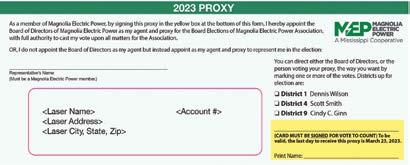


Here is a checklist to help you understand the proxy:
• Three candidates have been nominated from their respective districts by a nominating committee. For anyone who wants to know more about the candidates, please see the brochure that is enclosed in the proxy envelope for additional information, or read more about them in our board election story above.
• If you leave the Representative’s Name line blank, then the Board of Directors will serve as your proxy. They will cast your vote for you. If you wish to direct the board to vote for a certain nominee, then you would need to check that name. Don’t forget to sign the proxy before you drop it in the mail. There is an envelope provided to mail it to an accounting firm who will oversee all of the proxies.
• If you wish to name someone to be your proxy then you need to put their name on the Representative’s Name line, then sign the proxy and drop it in the envelope that was provided.
Scott Smith, a resident of the Heucks Retreat community in Lincoln County, is a beef cattle farmer, chicken farmer, and vice-president of Smith Lake Farms, which is a beef producer. He serves as a deacon and Sunday School teacher at Easthaven Baptist Church. He is a current Magnolia Electric board member.
Cindy Ginn lives in the Midway community of Walthall County. She retired from the Walthall County Board of Supervisors after 28 years as Comptroller and Payroll Clerk for the county. She is married to Roger A. Ginn, and they are members of Centerville Baptist Church, where she serves as church Treasurer. They have five children and 13 grandchildren. She currently serves as a Director on Magnolia Electric’s Board of Directors.
“I would ask that our members look for the proxies that dropped in the mail on Feb. 8 and be a part of our election process by sending in your proxies,” Smith said.
By sending in your proxy, a member can be eligible for the drawing for free electricity. Also, anyone who sends in a proxy will receive a 2024 MEP calendar in the mail around Aug./Sept. 2023.
To be eligible for the drawing, the signed proxy must be received at White and Associates, LLC, a Brookhaven accounting firm, by March 23 to be valid for the elections.
Leave blank if you want the board to serve as your proxy.
If you would like to designate a representative to serve as proxy, put their name here.

Sign your name.
• Above all matters, regardless if you let the board serve as your proxy, or you designate a proxy, you MUST SIGN your proxy before dropping it in the envelope provided or it will be invalid. Your proxy includes you in a drawing for prizes.




 by Abby Berry
by Abby Berry
Storm season is upon us, which means greater potential for power outages. If you’re planning to use a portable generator in the event of an outage, your electric co-op reminds you to play it safe. With proper use and maintenance, portable generators can provide great convenience during an outage. However, when generators are used incorrectly, they can be extremely hazardous. In a 2022 report, the Consumer Product Safety Commission estimated 85 U.S. consumers die every year from carbon monoxide (CO) poisoning caused by gasolinepowered portable generators.

Install backup CO alarms. Keep children and pets away from portable generators at all times.


Position generators at least 25 feet outside the home, away from doors, windows, and vents that can allow CO to enter the home.

Ensure your generator is properly grounded. Use a portable ground fault circuit interrupter (GFCI) to prevent electric shock injuries.
Use three-pronged extension cords that are rated to handle the load of the generator. Inspect extension cords for cuts, frays, or other damage before use.
Operate a generator inside your home or an enclosed (or partially-enclosed) space. Generators produce high levels of CO, which can be deadly.
Rely on generators as a full-time source of power. They should only be used temporarily or in emergency situations to power essential equipment or appliances.
Open windows or doors while the generator is running.


Overload generators. They should only be used to power essential equipment. Make sure your generator can handle the load of the items you plan to power.
Connect generators directly into household wiring unless you have an appropriate transfer switch installed. If a generator is connected to a home’s wiring without a transfer switch, power can backfeed along power lines and electrocute utility lineworkers making repairs.
While generators provide convenience during power outages, they can quickly become hazardous – even deadly – if improperly operated.
Before you operate a portable generator, be sure to thoroughly read the owner’s manual for important safety information and tips.
Abby Berry writes on consumer and cooperative a airs for the National Rural Electric Cooperative Association.







 Before you operate a portable generator, be sure to thoroughly read the owner’s manual for important safety information and tips. Photo Source: Honda
Before you operate a portable generator, be sure to thoroughly read the owner’s manual for important safety information and tips. Photo Source: Honda

The South Mississippi Boucherie is set for a return engagement at Southwest Events Center, Saturday, March 25. Last year’s competition attracted professional cooking teams from over the Southeastern US and amateur cooking teams from throughout Mississippi and the local area.
It’s a family-friendly event designed as a “spend all the time you wish” affair. Spend the day watching the cooking teams, hanging around for the judging, taking in the entertainment, or enjoying all sorts of local fare from local and regional food trucks that will be set up for the day.
Trophies and prizes will be awarded to Professional and Patio (amateur) competitors this year as the event is sanctioned as part of the Memphis Barbeque Network. Application forms are available on the web at southmsboucherie.com. You can also access the website through the South Mississippi Boucherie Facebook page.

A day before the competition, cooking teams will begin arriving to get cookers lined up and to start slow smoking for the Boucherie. The main event for the public begins Saturday, March 25.
Tylertown Rotary Club kicks things off with a pancake breakfast from 7-10 a.m., for the public and spectators, and so competitors can fuel up for the last few hours of cooking time.
A 5K walk/run will be sponsored by Cardio World. It starts at 8 a.m. at the events center and ends at the same location.
Other activities are planned throughout the day. There’s a food truck festival for folks to sample the food that area food trucks have to offer. Local food trucks not only offer barbeque, but other local specialties as well.
A cake and pie baking contest will be open to the public with a $100 grand prize. Drop off your entries Friday night, March 24, then come back Saturday to see the judges’ results.
Craft vendors will be set up the day of the competition. There will also be a Kids’ Korner with inflatables and face painting, plus an on-site playground.
Entertainment will be back this year with a mix of local and regional bands, including 98 West and local youth groups.
For entry information for the cooking events, vendor space, the 5K and fun run, search South MS Boucherie on Facebook or go to thesouthmsboucherie.com.


Each year, Magnolia Electric Power honors the winners of the Cooperative Youth Leaders program with a dinner for the students and their parents. Those also attending include MEP Board of Directors and MEP sta , along with the organizers of the event from Electric Cooperatives of Mississippi.


The group comes together for a Parents’ Night Dinner before the winners take their trip to Jackson. The Parents’ Night Dinner is a chance for our Cooperative Youth Leaders’ participants and their parents to ask questions concerning both trips to Jackson and Washington, D.C. and receive trip information from our Cooperative Youth Leaders Co-directors, Lydia Walters and Chris Alexander.
Brice, Isabella, and Maggie will continue their journey with the Cooperative Leaders Workshop in Jackson, set for March 1-3, before taking a week-long trip to Washington, D.C. in June.






 Winner from West Lincoln High School: (From left) Eli Ferguson, Valerie Ferguson, Brice Peeples, MEP General Manager Darrell Smith, and MEP Board of Directors, Cindy Ginn and Odell McKenzie.
Winner from McComb High School: (From left) Perry Clark Sr., Isabella Clark, MEP General Manager Darrell Smith, and MEP Board of Directors, Cindy Ginn and Odell McKenzie.
Winner from Brookhaven High School: (From left) Chris Sheppard, Christy Sheppard, Maggie Sheppard, MEP General Manager Darrell Smith, and MEP Board of Directors, Cindy Ginn and Odell McKenzie.
Winner from West Lincoln High School: (From left) Eli Ferguson, Valerie Ferguson, Brice Peeples, MEP General Manager Darrell Smith, and MEP Board of Directors, Cindy Ginn and Odell McKenzie.
Winner from McComb High School: (From left) Perry Clark Sr., Isabella Clark, MEP General Manager Darrell Smith, and MEP Board of Directors, Cindy Ginn and Odell McKenzie.
Winner from Brookhaven High School: (From left) Chris Sheppard, Christy Sheppard, Maggie Sheppard, MEP General Manager Darrell Smith, and MEP Board of Directors, Cindy Ginn and Odell McKenzie.






Storm season is upon us, which means greater potential for power outages. If you’re planning to use a portable generator in the event of an outage, your electric co-op reminds you to play it safe.
With proper use and maintenance, portable generators can provide great convenience during an outage. However, when generators are used incorrectly, they can be extremely hazardous. In a 2022 report, the Consumer Product Safety Commission estimated 85 U.S. consumers die every year from carbon monoxide (CO) poisoning caused by gasolinepowered portable generators.








Install backup CO alarms. Keep children and pets away from portable generators at all times.


Position generators at least 25 feet outside the home, away from doors, windows, and vents that can allow CO to enter the home.



Ensure your generator is properly grounded. Use a portable ground fault circuit interrupter (GFCI) to prevent electric shock injuries.
Use three-pronged extension cords that are rated to handle the load of the generator. Inspect extension cords for cuts, frays, or other damage before use.
Operate a generator inside your home or an enclosed (or partially-enclosed) space. Generators produce high levels of CO, which can be deadly.
Rely on generators as a full-time source of power. They should only be used temporarily or in emergency situations to power essential equipment or appliances.
Open windows or doors while the generator is running.







Overload generators. They should only be used to power essential equipment. Make sure your generator can handle the load of the items you plan to power.
Connect generators directly into household wiring unless you have an appropriate transfer switch installed. If a generator is connected to a home’s wiring without a transfer switch, power can backfeed along power lines and electrocute utility lineworkers making repairs.
While generators provide convenience during power outages, they can quickly become hazardous – even deadly – if improperly operated. Before you operate a portable generator, be sure to thoroughly read the owner’s manual for important safety information and tips. Abby Berry



By moving heat instead of creating it, a heat pump water heater uses 60% less energy than electric storage water heaters. That can add up to hundreds of dollars a year and thousands during the life of the water heater.


Improved controls make it easy to set the desired temperature and programming, including vacation mode, which saves energy when you are out of town.

Some models o er Wi-Fi connectivity to be controlled by a smartphone from anywhere. Other helpful features include leak detection and automatic shuto .

Consider upgrading to an energy e cient heat pump water heater. Heat pump water heaters — also called hybrid water heaters — use heat pump technology to heat water more e ciently than a standard electric storage water heater. Think of them as a standard water heater with a heat pump on top. The heat pump heats the water two to three times more e ciently than the electric elements, but the unit still has the electric elements as backup, if needed.





A heat pump water heater uses heat from a room to heat water. It tends to make the space about 2 degrees cooler, which is something to consider before installation. Ideal placement is an unconditioned space, such as a garage or unheated basement. A heat pump water heater requires enough space around the unit to supply the air needed for e cient operation — about 750 cubic feet.
Heat pump water heaters tend to be slightly taller than storage water heaters and require additional clearance above the unit to access the filter for cleaning. If your water heater is in a conditioned space or a room smaller than the unit requires, venting might be a solution for your installation.
Another consideration is noise. A heat pump water heater generates about as much noise as a modern dishwasher, so it may not be a good solution if the water heater is located where sound could be a nuisance. Installing a heat pump water heater is much like installing a standard electric water heater, except for the location of the cold-water inlet, which is located at the bottom of the unit.
Because moisture in the air condenses when it is drawn through the heat pump, it also requires a condensate drain that must be routed to a drain or pumped outside of the home.






Heat pump water heaters can replace electric, gas, or propane water heaters. They typically require a 240-volt circuit, which might necessitate an electrical upgrade by a licensed electrician.

QI’m looking for options to replace my old water heater. What should I choose to make my home’s water heating more e cient and save money?Heat pump water heaters make it easy to set the desired temperature and programming, including vacation mode, which saves energy when you are out of town. Photo Credit: Hot Water Solutions
Here are some details about their e ciency, how the units operate, installation considerations, and when you should replace your old water heater.



The life expectancy of a standard water heater is about 10 years. If your water heater is older than that or showing signs of failing, you may want to consider replacing it with a heat pump water heater before it fails.
It’s easier to find the product you want when it is not an emergency replacement. It also can be more expensive to replace it during an emergency. While heat pump water heaters are sold at a higher price than standard water heaters, the cost savings over time can o set the purchase and installation cost — and will result in a more energy e cient home.
You also are likely to save by taking advantage of sales, rebates, or tax credits. Check with your electric utility, state department of energy and federal tax information before purchasing a new water heater.


I installed a heat pump water heater in my home. I love it and can see how my energy use has decreased since installation. Now, if I can only figure out how to get my children to take shorter showers.






 by Abby Berry
by Abby Berry

There are a number of reasons why people are interested in cutting back on energy consumption — some are primarily motivated to save on their monthly energy bills while others may be more concerned about reducing their personal carbon footprint. Actively practicing energy e ciency and conservation provides multiple benefits. For parents, being more conscious about energy use can be used as a tool to teach kiddos about sustainable habits for the future; conserving energy also means fewer carbon emissions, which results in better air quality and a healthier environment; and I think we can all agree that saving money on our monthly utility bills is a great reason to monitor home energy use.
Regardless of why you’re interested in using less energy, there are several smart phone apps that can help you do just that!









I know what you’re thinking, and yes — to use a smart thermostat app, you must purchase a smart thermostat. But heating and cooling make up a large portion of the average home’s energy consumption (and cost!), so saving on heating and cooling can make a big impact on bills. Smart thermostats and their accompanying apps are handy and promote energy ecient behavior–and these devices have become much more a ordable over the years. You can purchase an ENERGY STAR®-certified smart thermostat for as low as $100, which can save you 8% on annual heating and cooling costs, about $50 per year. The device will quickly pay for itself, and you’ll gain insight into better ways to heat and cool your home. Plus, the ability to control the thermostat from anywhere can equate to real savings. We recommend trusted brands and devices, like Google’s Nest Learning Thermostat and Ecobee’s Smart Thermostat.












If you’re wanting to reduce energy use at home, it’s important to know where your consumption is going. Energy cost calculators can help pinpoint your energy use with a few simple steps and identify areas to save. The concept is pretty simple; just plug in the wattage of your various appliances and how often you use them to see which are using the most energy. Most energy cost calculator apps are free and can be downloaded to any Apple or Android device. If you browse the app store, you’ll find multiple energy cost calculator apps, but most are similar in functionality. Be sure to read the app’s reviews and download the one that best aligns with your energy e ciency goals.
If you’re competitive and enjoy gamifying — well, everything — the JouleBug app is right up your alley. JouleBug makes energy conservation simple and fun through personal tasks and badges earned within the app, group challenges you can tackle with friends, and communities you can join to learn about local sustainability e orts. The JouleBug app is free and can be downloaded to Apple or Android devices, and it’s an easy tool to make saving energy fun.
These are just a few apps that can help you find new ways to save energy. Smart light bulbs are typically paired with apps for convenient control of home lighting; smart plugs also come with apps to help you control how you power everyday devices and electronics. Whether you use an app or not, saving energy is always a smart idea that can help you save money on your monthly bills and reduce your carbon footprint.





 by Abby Berry
by Abby Berry
Storm season is upon us, which means greater potential for power outages. If you’re planning to use a portable generator in the event of an outage, your electric co-op reminds you to play it safe.
With proper use and maintenance, portable generators can provide great convenience during an outage. However, when generators are used incorrectly, they can be extremely hazardous. In a 2022 report, the Consumer Product Safety Commission estimated 85 U.S. consumers die every year from carbon monoxide (CO) poisoning caused by gasolinepowered portable generators.


Install backup CO alarms. Keep children and pets away from portable generators at all times.



Position generators at least 25 feet outside the home, away from doors, windows, and vents that can allow CO to enter the home.
Ensure your generator is properly grounded. Use a portable ground fault circuit interrupter (GFCI) to prevent electric shock injuries.
Use three-pronged extension cords that are rated to handle the load of the generator. Inspect extension cords for cuts, frays, or other damage before use.
Operate a generator inside your home or an enclosed (or partially-enclosed) space. Generators produce high levels of CO, which can be deadly.
Rely on generators as a full-time source of power. They should only be used temporarily or in emergency situations to power essential equipment or appliances.
Open windows or doors while the generator is running.






Overload generators. They should only be used to power essential equipment. Make sure your generator can handle the load of the items you plan to power.
Connect generators directly into household wiring unless you have an appropriate transfer switch installed. If a generator is connected to a home’s wiring without a transfer switch, power can backfeed along power lines and electrocute utility lineworkers making repairs.

While generators provide convenience during power outages, they can quickly become hazardous – even deadly – if improperly operated. Before you operate a portable generator, be sure to thoroughly read the owner’s manual for important safety information and tips.
Abby Berry writes on consumer and cooperative a airs for the National Rural Electric Cooperative Association.









The Tennessee Valley Authority supplied more power than at any other time in its history on Dec. 23, the first day of Winter Storm Elliot. Energy demand was close to 35% higher than expected on a typical winter day. The freezing temperatures also forced some of TVA’s gas and coal facilities to shut down.


TVA generates the power North East Mississippi Electric Power Association purchases to distribute to our members.
The load went up faster than anyone anticipated, and TVA has speculated that because of the rapid drop in such a large geographical area that millions of people’s heat came on at maximum capacity. TVA put some protective measures on their generators to prevent them from freezing. However, the unanticipated 30 to 40 MPH winds were too strong for the temporary protection. Therefore, this allowed the freezing of some instruments on several generators causing them to lose generation.
Because of the unprecedented strain on TVA’s system, they asked 153 local power companies on their system — including North East Power — to reduce power by as much as 10%. In many places, that reduction took the form of rolling blackouts: planned outages that reduced demand but left homes and businesses without power. This series of rolling blackouts, the first in the TVA’s 89-year history, prevented a cascading e ect on the electricity grid that would have had worse impacts on power customers.
North East Power reached an all-time winter peak Friday morning (Dec. 23), but the system was very stable. We were having no issues. When TVA started having trouble and called for the first reduction, we were able to get some industrial customers to cut back some loading — not for our benefit — but for the benefit of the Tennessee Valley and their whole system.
TVA also replaced some of their lost electricity with some osystem purchases. However, the system that they had purchased power from had some failures overnight, and by the morning of Dec. 24, TVA went into a 10% reduction causing North East to have rolling blackouts for the first time in our history.
At the time, our system was 15% below its peak and was still holding very well. We were having no issues. Through
the implementation of a robust control system North East implemented many years ago, we were able to monitor the system and remotely operate system substation breakers to achieve our 10% reduction.
The series of rolling blackouts lasted roughly four hours for the North East service territory. Our system performed extremely well. We opted for the 15-minute outages because we had the robust control system and could do it remotely. Other systems were having to do curtailments manually and were forced into 30-minute outages. Some of those outages got prolonged because of the cold weather.
TVA has put a task force together to determine the cause of the failures and change weatherization procedures to prevent some of the failures from happening again. They are also working on a better communications platform to notify people when there is a possibility of events like this happening in the future.


Much like TVA, we kind of got caught — we didn’t get a lot of upfront notice, and thus, we weren’t well prepared to notify our members in a timely manner, which is something we will look to improve on in the future.


North East has reviewed feedback and member-communication from this event and made plans for improvement should this issue ever arise again.
It’s unfortunate this happened during the holidays and disrupted people’s family time, but the patience the majority of our membership showed was very encouraging to those of us up here trying to keep the situation from being worse than it actually was.
by Keith Hayward General Manager/CEO




NE SPARC announces a milestone achievement — more than 10,000 customers on its world-class fiber optic network. State Sen. Nicole Akins Boyd and State Rep. Clay Deweese joined the NE SPARC team for the celebration at their o ces on Feb. 6.
Dennis Robbins was the 10,000th-customer to receive NE SPARC’s lightning-fast service. The SPARC team presented Robbins with a television to celebrate this occasion.
“We are absolutely thrilled to add our 10,000 th fiber customer,” said Randall Abel, chief operating o cer of NE SPARC. “This is a tremendous milestone and speaks to the dedication of all the SPARC employees and those committed to bringing incredibly fast and reliable broadband to our area. All of us at NE SPARC thank you for supporting us through the last three years!”
NE SPARC is now available in all of the North East Mississippi Electric Power Association service territory and the o -system build which includes Pontotoc and Union Counties, bringing the option to have high-speed fiber internet to areas unserved in the past. Fiber is the fastest, most reliable internet connection available. NE SPARC o ers speeds of up to 1 gigabit, which is enough bandwidth to power your whole business or household.
NE SPARC looks forward to continuing a tradition of excellence with reliable high-speed fiber internet and exceptional customer service.
NE SPARC is once again asking the public not to shoot at or around fiber lines.
In the last six months, fiber lines have been damaged six times due to gun fire. The most recent incident occurred on Lafayette Springs Road on Jan. 20 when lines were shot in two di erent places. In this latest incident, crews were able to locate the damage relatively quickly, so customers in that area were only without internet for about two hours.
Randall Abel, chief operating o cer for NE SPARC, said shooters
have damaged fiber optic lines causing roughly $40,000 in damage and knocking out the internet to thousands of customers.
NE SPARC is known for its fast, reliable service and anything done maliciously to prevent that will be taken seriously.



“Shooting anywhere near a fiber line is a federal crime,” Abel said. “There’s also consequences that could come with that if you are deemed liable for the damage.”
If you are using a gun, shoot smart. Don’t shoot at or near fiber lines.
Keith Hayward, CEO NE SPARC, and Randall Abel, COO NE SPARC, join State Rep. Clay Deweese and State Sen. Nicole Boyd in congratulating NE SPARC’s 10,000th customers – Dennis and Sharolyn Robbins. The Robbins were presented a 65-inch television as part of the celebration. The NE SPARC team with State Rep. Clay Deweese and State Sen. Nicole Boyd and the Robbins.

 by Abby Berry
by Abby Berry


There are a number of reasons why people are interested in cutting back on energy consumption — some are primarily motivated to save on their monthly energy bills while others may be more concerned about reducing their personal carbon footprint. Actively practicing energy e ciency and conservation provides multiple benefits. For parents, being more conscious about energy use can be used as a tool to teach kiddos about sustainable habits for the future; conserving energy also means fewer carbon emissions, which results in better air quality and a healthier environment; and I think we can all agree that saving money on our monthly utility bills is a great reason to monitor home energy use.
Regardless of why you’re interested in using less energy, there are several smart phone apps that can help you do just that!







I know what you’re thinking, and yes — to use a smart thermostat app, you must purchase a smart thermostat. But heating and cooling make up a large portion of the average home’s energy consumption (and cost!), so saving on heating and cooling can make a big impact on bills. Smart thermostats and their accompanying apps are handy and promote energy ecient behavior–and these devices have become much more a ordable over the years. You can purchase an ENERGY STAR®-certified smart thermostat for as low as $100, which can save you 8% on annual heating and cooling costs, about $50 per year. The device will quickly pay for itself, and you’ll gain insight into better ways to heat and cool your home. Plus, the ability to control the thermostat from anywhere can equate to real savings. We recommend trusted brands and devices, like Google’s Nest Learning Thermostat and Ecobee’s Smart Thermostat.
















If you’re wanting to reduce energy use at home, it’s important to know where your consumption is going. Energy cost calculators can help pinpoint your energy use with a few simple steps and identify areas to save. The concept is pretty simple; just plug in the wattage of your various appliances and how often you use them to see which are using the most energy. Most energy cost calculator apps are free and can be downloaded to any Apple or Android device. If you browse the app store, you’ll find multiple energy cost calculator apps, but most are similar in functionality. Be sure to read the app’s reviews and download the one that best aligns with your energy e ciency goals.
If you’re competitive and enjoy gamifying — well, everything — the JouleBug app is right up your alley. JouleBug makes energy conservation simple and fun through personal tasks and badges earned within the app, group challenges you can tackle with friends, and communities you can join to learn about local sustainability e orts. The JouleBug app is free and can be downloaded to Apple or Android devices, and it’s an easy tool to make saving energy fun.
These are just a few apps that can help you find new ways to save energy. Smart light bulbs are typically paired with apps for convenient control of home lighting; smart plugs also come with apps to help you control how you power everyday devices and electronics. Whether you use an app or not, saving energy is always a smart idea that can help you save money on your monthly bills and reduce your carbon footprint.

Last month I discussed the frequency of “Grey Swan Events.” Events that we knew were possible, but not expected. We have listened to the community and heard some of your greatest concerns. There are two that seem to stand out.






Last summer saw record high temperatures. These temperatures brought on a huge demand for generation fuel to produce electricity. Demand outpaced supply, and prices skyrocketed. Higher fuel costs and consumption due to heat caused the highest electric bills we’ve seen. Fortunately, reliability was strong and the lights, and more importantly, air conditioning, stayed on.
This past December we experienced extreme cold in our area, as did the majority of the United States. While pricing wasn’t a big issue, reliability was. Northcentral, at the request of the Tennessee Valley Authority (TVA), instituted rolling blackouts to keep the transmission grid stable. The failure of certain generation facilities found TVA short on generation, and once again supply, this time power, couldn’t meet demand.



Managing demand is important. We need to be good stewards of resources such as electricity and the fuels required to generate it. Supply, however, cannot be ignored.
We at Northcentral support the responsible use of renewables and a diverse portfolio of generation. We can’t, however, give up on legacy fossil fuel generation completely until a reliable and sustainable
path forward can be determined. We have, as a friend of mine put it, “burned down the old barn before building the new one.” We can’t just halt all power plant construction, and close operationally sound plants, and not expect higher rates and decreased reliability.
Being environmentally conscious is a good thing. Wind and solar have a role in a diverse energy generation mix, but these alternatives are not always available. Reliable, 24/7, base generation is required, and at the moment I don’t see a firm plan for it going forward. Coal is abandoned, and extremists and government regulations have slowed nuclear construction.
A balanced mix of generation is vital for our community. Northcentral will continue to advocate for this diversity. We can’t allow reliability and a ordability to be a thing of the past. We can’t allow extreme pricing and decreased availability of power to be something we grow accustomed to.

Stay Safe.
by Kevin Doddridge General Manager/CEO






By moving heat instead of creating it, a heat pump water heater uses 60% less energy than electric storage water heaters. That can add up to hundreds of dollars a year and thousands during the life of the water heater. Improved controls make it easy to set the desired temperature and programming, including vacation mode, which saves energy when you are out of town.
Some models o er Wi-Fi connectivity to be controlled by a smartphone from anywhere. Other helpful features include leak detection and automatic shuto .

Consider upgrading to an energy e cient heat pump water heater. Heat pump water heaters — also called hybrid water heaters — use heat pump technology to heat water more e ciently than a standard electric storage water heater. Think of them as a standard water heater with a heat pump on top. The heat pump heats the water two to three times more e ciently than the electric elements, but the unit still has the electric elements as backup, if needed.





A heat pump water heater uses heat from a room to heat water. It tends to make the space about 2 degrees cooler, which is something to consider before installation. Ideal placement is an unconditioned space, such as a garage or unheated basement. A heat pump water heater requires enough space around the unit to supply the air needed for e cient operation — about 750 cubic feet.
Heat pump water heaters tend to be slightly taller than storage water heaters and require additional clearance above the unit to access the filter for cleaning. If your water heater is in a conditioned space or a room smaller than the unit requires, venting might be a solution for your installation. Another consideration is noise. A heat pump water heater generates about as much noise as a modern dishwasher, so it may not be a good solution if the water heater is located where sound could be a nuisance. Installing a heat pump water heater is much like installing a standard electric water heater, except for the location of the cold-water inlet, which is located at the bottom of the unit.
Because moisture in the air condenses when it is drawn through the heat pump, it also requires a condensate drain that must be routed to a drain or pumped outside of the home.







Heat pump water heaters can replace electric, gas, or propane water heaters. They typically require a 240-volt circuit, which might necessitate an electrical upgrade by a licensed electrician.


QI’m looking for options to replace my old water heater. What should I choose to make my home’s water heating more e cient and save money?Heat pump water heaters make it easy to set the desired temperature and programming, including vacation mode, which saves energy when you are out of town. Photo Credit: Hot Water Solutions
Here are some details about their e ciency, how the units operate, installation considerations, and when you should replace your old water heater.




The life expectancy of a standard water heater is about 10 years. If your water heater is older than that or showing signs of failing, you may want to consider replacing it with a heat pump water heater before it fails.
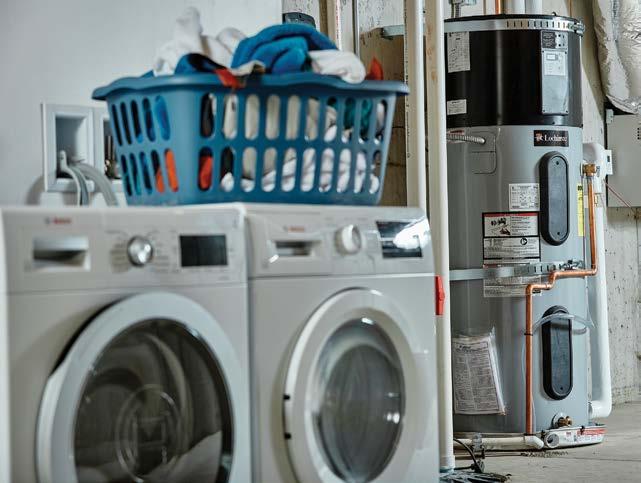
It’s easier to find the product you want when it is not an emergency replacement. It also can be more expensive to replace it during an emergency. While heat pump water heaters are sold at a higher price than standard water heaters, the cost savings over time can o set the purchase and installation cost — and will result in a more energy e cient home. You also are likely to save by taking advantage of sales, rebates, or tax credits. Check with your electric utility, state department of energy and federal tax information before purchasing a new water heater.
I installed a heat pump water heater in my home. I love it and can see how my energy use has decreased since installation. Now, if I can only figure out how to get my children to take shorter showers.
 Ideal placement of a heat pump water heater is in an unconditioned space, such as a garage or unheated basement. Photo Credit: Hot Water Solutions
Miranda Boutelle is the chief operating o cer at E ciency Services Group in Oregon, a cooperatively owned energy e ciency company.
By moving heat instead of creating it, a heat pump water heater uses 60% less energy than electric storage water heaters.
Photo Credit: Hot Water Solutions
Ideal placement of a heat pump water heater is in an unconditioned space, such as a garage or unheated basement. Photo Credit: Hot Water Solutions
Miranda Boutelle is the chief operating o cer at E ciency Services Group in Oregon, a cooperatively owned energy e ciency company.
By moving heat instead of creating it, a heat pump water heater uses 60% less energy than electric storage water heaters.
Photo Credit: Hot Water Solutions





 by Abby Berry
by Abby Berry
Storm season is upon us, which means greater potential for power outages. If you’re planning to use a portable generator in the event of an outage, your electric co-op reminds you to play it safe. With proper use and maintenance, portable generators can provide great convenience during an outage. However, when generators are used incorrectly, they can be extremely hazardous. In a 2022 report, the Consumer Product Safety Commission estimated 85 U.S. consumers die every year from carbon monoxide (CO) poisoning caused by gasoline-powered portable generators.


Install backup CO alarms. Keep children and pets away from portable generators at all times.

Position generators at least 25 feet outside the home, away from doors, windows, and vents that can allow CO to enter the home.


Ensure your generator is properly grounded. Use a portable ground fault circuit interrupter (GFCI) to prevent electric shock injuries.
Use three-pronged extension cords that are rated to handle the load of the generator. Inspect extension cords for cuts, frays, or other damage before use.
Operate a generator inside your home or an enclosed (or partially-enclosed) space. Generators produce high levels of CO, which can be deadly.
Rely on generators as a full-time source of power. They should only be used temporarily or in emergency situations to power essential equipment or appliances.
Open windows or doors while the generator is running.

Overload generators. They should only be used to power essential equipment. Make sure your generator can handle the load of the items you plan to power.
Connect generators directly into household wiring unless you have an appropriate transfer switch installed. If a generator is connected to a home’s wiring without a transfer switch, power can backfeed along power lines and electrocute utility lineworkers making repairs.
While generators provide convenience during power outages, they can quickly become hazardous – even deadly – if improperly operated.
Before you operate a portable generator, be sure to thoroughly read the owner’s manual for important safety information and tips.
Abby Berry writes on consumer and cooperative a airs for the National Rural Electric Cooperative Association.







 Before you operate a portable generator, be sure to thoroughly read the owner’s manual for important safety information and tips. Photo Source: Honda
Before you operate a portable generator, be sure to thoroughly read the owner’s manual for important safety information and tips. Photo Source: Honda


Pearl River Valley Electric o ers a variety of options for you to understand your electric use. Over the years, we have published several brochures and booklets that o er energy savings tips that are available in our o ces and online in our website’s help center at www.prvepa.com.
Some of the most useful information available is the ability to view your home’s daily, weekly, and monthly electrical use at any time. This information is available on our website and through our app. Members can access this information by clicking the “Pay My Bill” or “Manage My Account” buttons and following the steps in the EmPowered member service portal. Members can also access this information by downloading our app in their app store. Simply search for “PRVEPA” and follow the steps.



Through the member portal and the app, members can view the amount of kilowatt hours recorded by their meter, allowing them to compare one month with another. Daily temperatures are also shown, so members can see the e ect weather has on their electric use.







“The ability to make wise energy use decisions can help member’s save on their power bill,” said Trey Ware, energy services advisor. “The tools available on our website and in our app can help members see how their energy use is influenced by weather and household patterns.”

Members can also call or visit any Pearl River Valley Electric o ce for information about their bill.












In almost 84 years, Pearl River Valley Electric’s distribution system has grown to meet the demand of over 51,000 meters. The system now includes more than 6,000 miles of power lines throughout a 12-county service area. To maintain the integrity of the system and to ensure public safety, PRVEPA runs an extensive right-of-way program.


We want members to understand that maintaining right-of-way (ROW) is not an inconvenience, it’s a necessity. Controlling vegetation within our ROW assures safe access for employees when they are troubleshooting outages and repairing downed power lines.

Clearing brush and other low-growing vegetation is accomplished by a combination of trimming and cutting trees, bush-hogging, and herbicide application. We use o -the-shelf, non-restrictive herbicides because they are e ective, economical, and environmentally-friendly. They are not harmful to humans, pets, or livestock. Managing vegetation in this way also allows native grasses and wild-flowers to grow, thereby improving the aesthetics and wildlife habitat along the ROW.
The map below shows where contract crews will be clearing trees, removing underbrush, and mowing ROW in the upcoming months. Please visit the technical services category in our help center on our website, www.prvepa.com for a more detailed map.
Planting your landscaping properly can ensure that it does not adversely impact Pearl River Valley Electric’s infrastructure. PRVEPA’s system has ROW widths ranging from 30 feet (for most single-phase lines) to 50 feet (for three-phase lines).
When landscaping nears power lines, choose shrubs or small trees and keep them spaced outside of the right-of-way. See chart below for spacing.
There are also restrictions about what can be planted around pad-mounted transformers and other underground facilities. Be sure to allow the required clearance shown on the transformer to provide adequate access to equipment.
To be specific, do not plant anything closer than 10 feet from the transformer’s lock side and no closer than 4 feet on the remaining sides. If vegetation is planted within these areas, PRVEPA crews may have to clear enough space to create a safe working environment to perform maintenance operations.
Remember, before doing any landscaping in the vicinity of your transformer, you must call 811 (the Mississippi one-call number) at least two working days before breaking ground. By then, all underground utilities can be marked with flags or paint. If you have any questions regarding ROW clearances, maintenance and proper landscaping, please contact your local PRVEPA o ce.
20-30 FEET FROM LINE
Flowering Dogwood, Japanese Lilac, Kousa, Dogwood, Ornamental Crabapple, Redbud, Stewartia
30-35 FEET FROM LINE
Bradford Pear, Carolina Silverbell, Golden Raintree, Ornamental Cherry Saucer Magnolia, Serviceberry, Sourwood, Winter King Hawthorne
40-45 FEET FROM LINE
Red Maple, Shagbark Hickory, Lacebark Elm, White Oak, Hemlock,

Applications are available at PRVEPA o ces and at www.prvepa.com.
Completed applications must be postmarked or emailed by August 11. Scholarship recipients must be a PRVEPA member, spouse, or child of a member participating in the Round Up program.
Recipients must be full time (12 hours or more per semester) freshmen students enrolled in academic or career-technical programs.
Scholarship funds will be credited to each student’s college account — no checks will be issued to individuals.
• Scholarships should be awarded by the end of September. Students must be enrolled in good standing at the time funds are released to the colleges.
Funded by members who are rounding up their monthly bills, these scholarships are intended to assist students who will attend a Mississippi community college as a freshman this fall.
More information is available at www.prvepa.com.
Source: call811.com
1. NOTIFY
Call 8-1-1 or make a request online two to three days before your work begins. The operator will notify the utilities a ected by your project.
2. WAIT
Working on an outdoor project? Careless digging poses a threat to people, pipelines and underground facilities. Always call 8-1-1 first. Here are five easy steps for safe digging: 2-3
Wait two to three days for a ected utilities to respond to your request. They will send a locator to mark any underground utility lines.
3. CONFIRM
Confirm that all a ected utilities have responded to your request by comparing the marks to the list of utilities the 8-1-1 call center notified.
4. RESPECT
Respect the markers provided by the a ected utilities. The markers are your guide for the duration of your project.
5. DIG CAREFULLY
If you can’t avoid digging near the markers (within 18-24 inches on all sides, depending on state laws), consider moving your project location.
Pearl River Valley Electric is on social media. Keep up to date with PRVEPA news and receive information on outages.
Simply search for @MyPRVEPA on Facebook and Twitter to follow us.
 Spruce
Spruce
Powered by Pearl River Valley Electric
Easily set up and share guest network(s) when you have visitors. You can set up multiple guest profiles and manage them with time limits and selected days.
View a list of devices connected to your Wi-Fi network with just a glance.
Test your internet speed to make sure everything is happy and humming.
Set family member profiles and assign devices for each profile. With just a tap, pause internet access temporarily to a single child or multiple children for screen-free time.
PearlComm Fiber has recently hit over 3,000 customers! If you are a current subscriber, we encourage you to get the most out of your experience by downloading the PearlComm Fiber app. The app is your gateway to complete control over your Wi-Fi network. It is free to use and comes with a variety of useful features including:
If it’s connected to your network, it’s protected with whole home Wi-Fi security powered by ProtectIQ.
Decide when devices should be online (or offline!) by profile and set time limits for individual sites or apps.
Restrict or allow content by categories, specific apps or individual websites powered by ExperienceIQ.
Easily check how much bandwidth each device on your network is using and pause or prioritize specific devices, so you can fast track the kids streaming or your work with home applications.
Recently, Pearl River Valley Electric received reports of telephone scams being directed at members. While the accounts of the scams have varied slightly, there are certain commonalities which members need to be aware of. The callers have often appeared to use Pearl River Valley Electric numbers. Often scammers can use software that makes caller ID look like it’s coming from PRVEPA. Next, members have reported that the caller says their electric service will be disconnected unless a payment is made within a very short timeframe. The caller then provides false information about where and how a cash or credit card payment can be made, and they also provide a bogus number to call for verification.
Please remember that Pearl River Valley Electric would never make a call to a member with such a request, that is not the way we conduct business. We urge our members not to fall for such calls or to give any personal or banking information over the phone to someone they don’t know.
Here are three tips that may help you protect your bank accounts, credit cards and identity:
1. Never give any personal information over the phone to someone you do not know.
2. Call your local electric cooperative to verify a call (using one of the numbers listed below) before you give any account or payment information over the phone.
3. Electric utilities will not tell you to pay your bill within a short period of time with gift cards, pre-loaded money cards or through wiring money.
PONTOTOC 662-489-3211 • Fax: 662-489-5156









P.O. Drawer 718 • 12 South Main Street, Pontotoc, MS 38863

BRUCE 662-983-2727

P.O. Box 415 • 129 South Newberger Street, Bruce, MS 38915





 by Abby Berry
by Abby Berry
Storm season is upon us, which means greater potential for power outages. If you’re planning to use a portable generator in the event of an outage, your electric co-op reminds you to play it safe.
With proper use and maintenance, portable generators can provide great convenience during an outage. However, when generators are used incorrectly, they can be extremely hazardous. In a 2022 report, the Consumer Product Safety Commission estimated 85 U.S. consumers die every year from carbon monoxide (CO) poisoning caused by gasolinepowered portable generators.




Install backup CO alarms. Keep children and pets away from portable generators at all times.
Position generators at least 25 feet outside the home, away from doors, windows, and vents that can allow CO to enter the home.
Ensure your generator is properly grounded. Use a portable ground fault circuit interrupter (GFCI) to prevent electric shock injuries.
Use three-pronged extension cords that are rated to handle the load of the generator. Inspect extension cords for cuts, frays, or other damage before use.

Operate a generator inside your home or an enclosed (or partially-enclosed) space. Generators produce high levels of CO, which can be deadly.
Rely on generators as a full-time source of power. They should only be used temporarily or in emergency situations to power essential equipment or appliances.
Open windows or doors while the generator is running.


Overload generators. They should only be used to power essential equipment. Make sure your generator can handle the load of the items you plan to power.
Connect generators directly into household wiring unless you have an appropriate transfer switch installed. If a generator is connected to a home’s wiring without a transfer switch, power can backfeed along power lines and electrocute utility lineworkers making repairs.

While generators provide convenience during power outages, they can quickly become hazardous – even deadly – if improperly operated. Before you operate a portable generator, be sure to thoroughly read the owner’s manual for important safety information and tips.
Abby Berry writes on consumer and cooperative a airs for the National Rural Electric Cooperative Association.



 by Abby Berry
by Abby Berry
There are a number of reasons why people are interested in cutting back on energy consumption — some are primarily motivated to save on their monthly energy bills while others may be more concerned about reducing their personal carbon footprint. Actively practicing energy e ciency and conservation provides multiple benefits. For parents, being more conscious about energy use can be used as a tool to teach kiddos about sustainable habits for the future; conserving energy also means fewer carbon emissions, which results in better air quality and a healthier environment; and I think we can all agree that saving money on our monthly utility bills is a great reason to monitor home energy use.
Regardless of why you’re interested in using less energy, there are several smart phone apps that can help you do just that!
















which can help




save energy and money.
I know what you’re thinking, and yes — to use a smart thermostat app, you must purchase a smart thermostat. But heating and cooling make up a large portion of the average home’s energy consumption (and cost!), so saving on heating and cooling can make a big impact on bills. Smart thermostats and their accompanying apps are handy and promote energy ecient behavior–and these devices have become much more a ordable over the years. You can purchase an ENERGY STAR®-certified smart thermostat for as low as $100, which can save you 8% on annual heating and cooling costs, about $50 per year. The device will quickly pay for itself, and you’ll gain insight into better ways to heat and cool your home. Plus, the ability to control the thermostat from anywhere can equate to real savings. We recommend trusted brands and devices, like Google’s Nest Learning Thermostat and Ecobee’s Smart Thermostat.
If you’re wanting to reduce energy use at home, it’s important to know where your consumption is going. Energy cost calculators can help pinpoint your energy use with a few simple steps and identify areas to save. The concept is pretty simple; just plug in the wattage of your various appliances and how often you use them to see which are using the most energy. Most energy cost calculator apps are free and can be downloaded to any Apple or Android device. If you browse the app store, you’ll find multiple energy cost calculator apps, but most are similar in functionality. Be sure to read the app’s reviews and download the one that best aligns with your energy e ciency goals.
If you’re competitive and enjoy gamifying — well, everything — the JouleBug app is right up your alley. JouleBug makes energy conservation simple and fun through personal tasks and badges earned within the app, group challenges you can tackle with friends, and communities you can join to learn about local sustainability e orts. The JouleBug app is free and can be downloaded to Apple or Android devices, and it’s an easy tool to make saving energy fun.
These are just a few apps that can help you find new ways to save energy. Smart light bulbs are typically paired with apps for convenient control of home lighting; smart plugs also come with apps to help you control how you power everyday devices and electronics. Whether you use an app or not, saving energy is always a smart idea that can help you save money on your monthly bills and reduce your carbon footprint.
INGREDIENTS
1 box banana cake mix
2 eggs
¼ cup oil

1⁄3 cup sugar
2 bananas, mashed ¼ cup nuts, optional
1 cup water
Mix all above and put in 9” x 13” pan. Bake at 350 degrees for 35-40 minutes. For frosting, combine 1 and a half bananas (mashed), 1 box powdered sugar, 2 teaspoons vanilla, and a half teaspoon of salt. Spread onto cooled cake. Keep refrigerated.

2 sticks margarine
8 ounces cream cheese
3 cups sugar
1 teaspoon vanilla
1 stick butter
6 eggs
3 cups plain flour
INGREDIENTS

4 eggs
1 box yellow cake mix

1 stick margarine
1 box confectioner sugar
8 ounces cream cheese, softened
Mix 1 egg, melted margarine, and cake mix. Put in greased 9” x 13” pan. Mix 3 eggs, confectioner sugar, and softened cream cheese, and pour over ingredients in pan. Bake at 350 degrees for about 40 minutes.
Mark (PEPA Retiree) and Jenna Patterson
Cream margarine, butter, and cream cheese until flu y. Add sugar gradually. Start adding flour after beating in two well-beaten eggs. Add one egg at a time, alternating with flour and ending with flour. Bake in a greased and floured tube pan. Bake at 275 degrees for one hour, then raise temperature to 300 degrees for approximately one hour. Do not preheat oven.

You’ll
Use
• Easy payment options
• Pay securely from your phone or tablet - anytime, anywhere



• Monitor your monthly utility usage and cost





• Receive important alerts
• Set up Autopay
It’s quick and easy to manage your account. Use the QR codes below to visit the Customer Portal or download the new Mobile App from the Apple or Google Play stores today!





Singing River Electric’s primary job is keeping the lights on, but our passion is serving our members. Because we’re a cooperative, our purpose is to enrich the lives of our members through our services and products, while serving the long-term interests of our community. Member and subscriber focus is at the heart of who we are.
We are always seeking ways to live out the seven cooperative principles, especially Concern for Community. Singing River Electric was built by and is led by the members we serve. Whether tested by severe weather events or a pandemic, our co-op puts people first, not just during tough times, but all the time.
Over the years, our charitable e orts, employee volunteer service hours, and other projects have assisted local non-profits, supported local schools and young people, contributed to local food banks, assisted families in need to keep the lights on, and much, much more.
Since the beginning of this year, our employees completed three Cooperative Days of Service projects in Jackson, George, and Greene counties. Partnering with the Town of Leakesville, the Pascagoula River


Audubon Center, and SREA Head Start not only let our employees perform needed work but also gave them the chance to learn more about these local organizations.
Teaching electric safety at schools, attending career fairs to share electric industry job opportunities, and participating in the Cooperative Youth Leaders program keep us in touch with local schools. Our NHN Grant program allows us to help six to eight local non-profits annually with specific needs and projects.
Our commitment to our local communities extends beyond providing quality, responsive electric service to o ering high-speed fiber internet. Singing River Electric and SR Connect, our fiber a liate, are working to bring lasting change to our rural communities by unlocking remote work, healthcare and education, and improving entertainment through lightning-fast fiber internet.
We are committed to improving our communities. While the environment in which we operate is constantly changing, one thing remains the same, our dedication to working together with you - the members we serve.
by Brian Hughey General Manager and CEOWarmer temps are right around the corner. It is the time of year we can start preparing to make improvements to our homes to help reduce those summer electric bills. One way to reduce the amount of electricity consumed is to reduce the amount of air infiltration through unsealed areas around windows and doors. By sealing doors and windows, you can reduce the amount of infiltration that occurs in your home – keeping more conditioned air in and less warm air out. Air infiltration or leaks can account for 25-40% of the energy used to heat and cool your home.
There are several inexpensive ways to tighten up your home. Caulking around the inside and outside of window seals as well as adding weather stripping around doors are great ways to reduce the amount of hot and humid air being pulled into your home. Doing this will cut down on your HVAC’s run time, which will result in considerable savings on your monthly bill.
More energy-saving tips:

• Set thermostat to 78° or higher when the temperature begins to climb during summer months.
• Use ceiling fans only in occupied rooms to create an extra cooling sensation when air is blown across your skin.


• Avoid running your dishwasher and/or clothes dryer during warmer times of the day.
singingriver.com/ways-to-save
Thank you for showing SRE linemen so much love! The response to our call for valentines for our linemen from schools, parents, and church groups was overwhelming with more than 450 valentines received from all over SRE’s service area. Not only our 85 linemen, but all SRE employees received one of the beautifully hand-decorated valentines because the response was so great. We read each and every one.



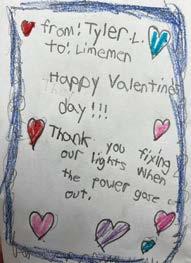


To celebrate Mississippi’s Arbor Day, observed the second Friday of February, SRE Fleet and Right-of-Way Coordinator Nick Greer helped students at three schools plant live oak trees on Feb. 10.




Students at St. Martin Middle, Agricola Elementary, and Sand Hill School learned about electric safety and tree planting tips. Two live oaks were planted at each school.

STEP 1: Make-ready engineering
Examine. Design.



STEP 2:
Make-ready construction
Planning the most efficient approach to fiber deployment.
STEP 3: Building a network from the ground up.
Construction
STEP 4: Connecting the dots. Splicing
STEP 5:
Service drop & drop splicing

The last outdoor step. Almost there…
STEP 6: The speed of light, right to your home.






Installation
















Neither do we. Text a Singing River Electric member service representative (MSR) at 228-591-9166. We will return your text and help resolve your issue or answer your inquiry. You can also text OUT to 601-947-1744 to report a power outage.
As of Nov. 2022, SRE members were automatically enrolled in outage texting with the cell phone number listed on their account. Members must have a mobile number on file to use outage texting because the system locates their account information with the number. Phone numbers and other contact information can be updated using the SmartHub mobile app, by texting a MSR, or by calling 601-947-4211 or any SRE o ce.
SR Connect is delivering lightning-fast, fiber internet. New fiber areas are announced by electric substation and feeder. You can search open fiber areas and your address for service at singingriverconnect.com/signup.



To find out which SRE substation and feeder serves your home, text a SRE MSR during business hours at 228-591-9166. Scan here!


SRE NHN Grant benefits St. Martin High School STEAM Team

Neighbors Helping Neighbors (NHN) Community Grants help Singing River Electric merge efforts with the hard work of those within our communities.
Since the program’s inception in 2001, $339,838.34 has been awarded to local non-profits in local communities.
Adding a competitive drone aspect to its established robotics team, the St. Martin Yellow Jackets STEAM Team is preparing its students for the future. Made up of 30 high school students, the robotics team uses the extracurricular program to hone their teamwork, communication, critical thinking, and problem-solving skills.
The $2,500 grant was used to purchase a competition drone, a competitive field, and flags to navigate the drone through.
“This is our 8th year of existence,” explains Richard Humphreys, CTE Engineering Instructor, and Yellow Jackets STEAM Team Mentor. “Adding drones to our curriculum will help spark an interest in the growing field of unmanned aerial systems.”
For more information on SRE NHN Community Grants and how to apply, visit singingriver.com/my-community. Grants for up to $2,500 are awarded to nonprofits in SRE’s service area three times a year in January, May, and September.
DATE:
Thursday, June 29, 2023
TIME: Registration – 5 p.m. Meeting – 6 p.m.
LOCATION:
SRE office, Lucedale
The meeting will include co-op business and director elections.
Be wary of calls, texts, and emails from unknown numbers or contacts. Scammers want to scare you and may claim you are overdue on your electric bill and threaten to disconnect service if you don’t pay immediately.
If this happens over the phone, hang up. Delete any scam texts or emails. To check on your bill, call us at 601-947-4211 or check your account status on the SmartHub app. Please report potential scams to us so we can warn other members.









We always want to be easily accessible when you need us. That’s why we opened several additional lines of communication with our members last year, and we are continuing down that path in 2023.
One of the best ways to report an outage, pay your bill, monitor your usage, and more is by using the new MyPower App. It is now available to download for Apple and Android devices. I am very excited about the app because it puts the power of Southern Pine at your fingertips. If you haven’t already downloaded the app, it is easy to download it by searching “My Power Southern Pine Elec MS” in the app store or scanning the QR code on this page. If you already have a MyPower account, then you’ll use the same credentials to login to the app. If you don’t, then you can create one in the app. It’s free and designed just for our members. The app is a great tool to help control costs by having access to energy use data at your fingertips. Members can choose to adjust their energy use to lower costs when consumption is higher.





Reaching us becomes particularly crucial when storms strike and outages occur. Reporting an outage is the best way you can help our team restore power quickly. The easiest way is to report using the MyPower App or text OUT to 1-800-231-5240 from any phone number associated with your account. You can also report an outage at the same number using the automated phone system. Easy, convenient, and consistent are what we strive for when communicating with the
Last year we opened a new call center to improve telephone response times. We also added call-back and voicemail features to our automated phone lines for times when you don’t want to remain on hold during busier call times. These features save your place in line, and a member service representative calls you back in the order we received your call.
We introduced a live chat feature on our website where you take care of business, report an outage, or get the answer to a question. The live chat is available from 8 a.m. to 5 p.m., Monday through Friday, and is sta ed by our knowledgeable member service representatives.
These new additions were designed with you in mind because we know when you need us, it’s important. We aim to make it as easy as possible for you to reach us when you need us, take care of business at your convenience, and provide you with the best member service experience around.
by Chris K. Rhodes President/CEO Southern Pine Electric











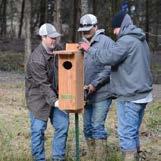







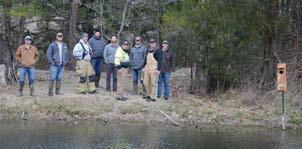










Southern Pine Electric joined six other Mississippi cooperatives to participate in Cooperative Day of Service in honor of Dr. Martin Luther King, Jr. Coordinated by Cooperative Energy, this is the fifth year of serving the communities we serve in honor of Dr. King’s legacy.



Employees of Southern Pine’s New Hebron district volunteered at Hazlehurst Elementary School to build a pollinator garden bed, pressure wash surfaces, and spruce up the front entrance. Employees in Taylorsville prepared and served over 250 meals at the Good Samaritan Center in Laurel. The Newton district team held a food drive and delivered it to a local food bank and Brandon district team worked with the City of Brandon to install wooden duck boxes around the quarry. Additionally, employees delivered socks that were collected to two Copiah County nursing centers.
“Although we love to help our community throughout the year, we especially look forward to Cooperative Day of Service to use our actions to honor Dr. Martin Luther King, Jr.’s legacy,” said Chris K. Rhodes, president and CEO of Southern Pine Electric. “We enjoy coming together with our sister co-ops to work to benefit thousands of Mississippians, and we’re grateful to have these opportunities to serve.”

Ryan grew up in Greenwood but has roots in the Southern Pine territory as his grandfather, Rex McRaney, grew up in Covington County in Lone Star. He and his wife of 11 years, Lauren, have two beautiful daughters, Marion, 4, and Rivers, 2. The young family lives in Hattiesburg with their three pets, a golden doodle named Georgia, Minnie the cat, and a fish called Busta Moon. They are members of Parkway Heights Methodist Church.
Ryan Robertson’s dad, Ronnie Robertson, left big shoes to fill when he passed away in 2015. Described in the Greenwood Commonwealth as a “leader who didn’t seek credit,” the elder Robertson served as general manager of Delta Electric Power Association. By all accounts, Ryan is doing an outstanding job of following in his father’s footsteps and living up to his family name.

Ryan has been a part of the Southern Pine team for eight years and was named chief financial o cer in 2022. He came to Southern Pine with a bachelor’s degree in accounting from the University of Mississippi and a law degree from the University of Mississippi School of Law. During his time at Southern Pine, Ryan has made many great memories but said there’s not one specific memory that is the best. “Some of the best memories I have of working here are from when I first started and had the opportunity to work in each district. I learned a lot about the operations of Southern Pine, but also had a chance to work with most of the employees,” Ryan said. “That was an invaluable experience, and I have many memories from that period. I learned about kids, grandkids, spouses, and ex-spouses, the best hunting spots, fishing spots, lunch spots, and so much more. I learned that my dad probably served a meal to most of the guys that provided mutual aid in the delta after the ’94 ice storm.”
Ryan coaches his daughter’s soccer team, allowing him to participate in something she likes to do. He enjoys family outings to the Hattiesburg Zoo and the Audubon Zoo in New Orleans. During summers, he and the family enjoy their neighborhood pool. These days don’t allow for much spare time for hobbies, with two daughters involved in dance, gymnastics, soccer, and more, but Ryan said he loves it and wouldn’t change a thing.
Ryan said he is thankful to work at Southern Pine and in the electric cooperative industry. “This industry has been good to my entire family,” said Ryan.

Some of the best memories I have of working here are from when I first started and had the opportunity to work in each district.






The annual energy bill for a typical single-family home is $2,060 in the United States. Have you ever wondered just where that money goes? Well, for the average family, a whopping 42% of that is made up of heating and cooling costs combined. Water heating is another 13% of the total cost. Electronics account for 21% with lighting at 12% and appliances at 12%. What are some ways you can reduce your bill and save money?

The top 10 money saving tips can save you a significant amount on your energy bill.
1. Replace any light bulb, especially ones that burn more than an hour per day, with a light-emitting diode (LED) bulb.






2. Seal from the inside. Air sealing is an inexpensive way to lower energy costs and improve comfort. Seal gaps and holes in walls, floors, and ceilings with caulk or foam sealant. Look for cracks around windows and where wires and pipes pass through.
3. Plug electronic devices such as cable boxes, printers, and TVs into power strips and turn them o during vacations or long periods without use. Smart power strips make it an easy task to save money.
4. Change your central HVAC system filter when dirty according to the manufacturers recommendations. Dirty filters can impact your home comfort and increase your electricity bill. Make sure to change out every 30 days.
5. A one-degree increase in heating setpoint or reduction in cooling setpoint can increase energy use by 3-5%, so to save money, set your HVAC unit to 78 degrees in the summer and 68 degrees in the winter.


For more tips on how to save money on your electric bill, visit southernpine.coop and follow us on Facebook, Twitter, and Instagram.

6. Have your duct work checked for leaks. Leaks at the return, air handler, and supply can be a major contributor to high bills. Mobile homes should be checked at the grill, cross over duct, and down flow air handler, for leaks.



7. Set both the upper and lower water heater thermostats no higher than 125 degrees.




8. An electric space heater can cost more than $100 per month to operate. Minimize their use, except for limited or temporary spot heating. Turn space heaters o when leaving a room.
9. Ensure refrigerator door seals are tight. Eliminate unnecessary refrigerators.






10. Close shades and drapes during the day to keep your home cooler in the summer and warmer in the winter.














These lines carry electricity to you from power plants.

This is where your local electric cooperative receives its electricity.
Next, we repair main lines that serve hospitals and other services we rely on.
We start with the lines that impact the most and work until everyone is back on.
Springtime is the season for thunderstorms and tornadoes. Thunderstorms can appear quickly without warning often spurring tornadoes, especially in the afternoon and evening hours. It’s important to always be prepared and know how to react before, during and after a storm. Being storm ready can save your life.
Every family needs an emergency plan that explains what to do, where to go and what you will need to protect yourself. If it’s available, go ahead and sign up for your community warning system. The Emergency Alert System and the National Oceanic and Atmospheric Administration provide emergency alerts. Make sure you have a radio, preferably an emergency weather radio, and fresh batteries. Identify nearby, sturdy buildings close to where you live, work or play. Make sure that limbs or trees are cut or trimmed away from your home to prevent them from falling and causing damage.
DURING
If you are outside and hear thunder, go indoors immediately. Listen to the weather alerts and be prepared to make changes in your emergency plan to adapt to the current situation. Unplug your appliances and any electronic devices to protect them from electrical surges. Avoid using running water or landline telephones as electricity could pass through plumbing and phone lines.
AFTER
Listen to your weather radio and reports from local authorities to determine if it is safe to go outside. Once outside, always be aware of your surroundings and avoid downed power lines and fallen trees. Following these simple tips could save you or your loved one’s life.
If a storm causes a power outage, please report it us by using our SmartHub app or calling 800-287-8564. Power restoration always follows the same process. A lineworker is sent to assess the situation and report the issue back to the dispatcher. Sometimes the lineworker can fix the issue and restore power. On other occasions, a crew will be needed to replace a cross-arm or pole. In every situation, we will work as quickly and as safely as possible to restore power.


FOR UPTODATE WEATHER AND EMERGENCY INFORMATION, FOLLOW THESE ACCOUNTS ON FACEBOOK AND TWITTER:




 by Abby Berry
by Abby Berry
Storm season is upon us, which means greater potential for power outages. If you’re planning to use a portable generator in the event of an outage, your electric co-op reminds you to play it safe. With proper use and maintenance, portable generators can provide great convenience during an outage. However, when generators are used incorrectly, they can be extremely hazardous. In a 2022 report, the Consumer Product Safety Commission estimated 85 U.S. consumers die every year from carbon monoxide (CO) poisoning caused by gasolinepowered portable generators.
Before you operate a portable generator, be sure to thoroughly read the owner’s manual for important safety information and tips. Photo Source: Honda

Operate a generator inside your home or an enclosed (or partially-enclosed) space. Generators produce high levels of CO, which can be deadly.
Open windows or doors while the generator is running.



Position generators at least 25 feet outside the home, away from doors, windows and vents that can allow CO to enter the home.


Ensure your generator is properly grounded. Use a portable ground fault circuit interrupter (GFCI) to prevent electric shock injuries.
Use three-pronged extension cords that are rated to handle the load of the generator. Inspect extension cords for cuts, frays or other damage before use.
Rely on generators as a full-time source of power. They should only be used temporarily or in emergency situations to power essential equipment or appliances.
Overload generators. They should only be used to power essential equipment. Make sure your generator can handle the load of the items you plan to power.
Connect generators directly into household wiring unless you have an appropriate transfer switch installed. If a generator is connected to a home’s wiring without a transfer switch, power can backfeed along power lines and electrocute utility lineworkers making repairs.
While generators provide convenience during power outages, they can quickly become hazardous – even deadly – if improperly operated. Before you operate a portable generator, be sure to thoroughly read the owner’s manual for important safety information and tips.
Abby Berry writes on consumer and cooperative a airs for the National Rural Electric Cooperative Association.








Anchorage, AK







Did you know that Southwest Electric maintains over 4,200 miles of line serving over 25,500 meters? If our power lines were stretched together end-to-end, they would span all the way from Natchez to Anchorage.













Southwest Electric’s Comfort Advantage program o ers an incentive if you are considering upgrading your HVAC system from an all-electric or gas unit to an energy-e cient heat pump. Members will qualify for up to a $400 incentive with $150 for each additional heat pump installed.
If you are interested in the Comfort Advantage program, contact our Member Services Department by calling 800-287-8564 or by emailing us at info@swepa.coop. You can also visit our website to download a printable brochure at southwestelectric.coop/comfort-advantage.













Need help downloading the app or using a feature? Contact our Member Services Department at 800-287-8564 or visit our website at southwestelectric.coop/smarthub/ for “How To” videos.















Storm season is upon us, which means greater potential for power outages. If you’re planning to use a portable generator in the event of an outage, your electric co-op reminds you to play it safe.
With proper use and maintenance, portable generators can provide great convenience during an outage. However, when generators are used incorrectly, they can be extremely hazardous. In a 2022 report, the Consumer Product Safety Commission estimated 85 U.S. consumers die every year from carbon monoxide (CO) poisoning caused by gasolinepowered portable generators.
Install backup CO alarms. Keep children and pets away from portable generators at all times.


Position generators at least 25 feet outside the home, away from doors, windows, and vents that can allow CO to enter the home.




Ensure your generator is properly grounded. Use a portable ground fault circuit interrupter (GFCI) to prevent electric shock injuries.





Use three-pronged extension cords that are rated to handle the load of the generator. Inspect extension cords for cuts, frays, or other damage before use.

Operate a generator inside your home or an enclosed (or partially-enclosed) space. Generators produce high levels of CO, which can be deadly.

Rely on generators as a full-time source of power. They should only be used temporarily or in emergency situations to power essential equipment or appliances. equipment
Open windows or doors while the generator is running.


Overload generators. They should only be used to power essential equipment. Make sure your generator can handle the load of the items you plan to power.

Connect generators directly into household wiring unless you have an appropriate transfer switch installed. If a generator is connected to a home’s wiring without a transfer switch, power can backfeed along power lines and electrocute utility lineworkers making repairs.
While generators provide convenience during power outages, they can quickly become hazardous – even deadly – if improperly operated. Before you operate a portable generator, be sure to thoroughly read the owner’s manual for important safety information and tips.

By moving heat instead of creating it, a heat pump water heater uses 60% less energy than electric storage water heaters. That can add up to hundreds of dollars a year and thousands during the life of the water heater. Improved controls make it easy to set the desired temperature and programming, including vacation mode, which saves energy when you are out of town.
Some models o er Wi-Fi connectivity to be controlled by a smartphone from anywhere. Other helpful features include leak detection and automatic shuto .

Consider upgrading to an energy e cient heat pump water heater. Heat pump water heaters — also called hybrid water heaters — use heat pump technology to heat water more e ciently than a standard electric storage water heater. Think of them as a standard water heater with a heat pump on top. The heat pump heats the water two to three times more e ciently than the electric elements, but the unit still has the electric elements as backup, if needed.





A heat pump water heater uses heat from a room to heat water. It tends to make the space about 2 degrees cooler, which is something to consider before installation. Ideal placement is an unconditioned space, such as a garage or unheated basement. A heat pump water heater requires enough space around the unit to supply the air needed for e cient operation — about 750 cubic feet.
Heat pump water heaters tend to be slightly taller than storage water heaters and require additional clearance above the unit to access the filter for cleaning. If your water heater is in a conditioned space or a room smaller than the unit requires, venting might be a solution for your installation.
Another consideration is noise. A heat pump water heater generates about as much noise as a modern dishwasher, so it may not be a good solution if the water heater is located where sound could be a nuisance.





Installing a heat pump water heater is much like installing a standard electric water heater, except for the location of the cold-water inlet, which is located at the bottom of the unit.

Because moisture in the air condenses when it is drawn through the heat pump, it also requires a condensate drain that must be routed to a drain or pumped outside of the home.




Heat pump water heaters can replace electric, gas, or propane water heaters. They typically require a 240-volt circuit, which might necessitate an electrical upgrade by a licensed electrician.

I’m looking for options to replace my old water heater. What should I choose to make my home’s water heating more e cient and save money?Heat pump water heaters make it easy to set the desired temperature and programming, including vacation mode, which saves energy when you are out of town. Photo Credit: Hot Water Solutions
Here are some details about their e ciency, how the units operate, installation considerations, and when you should replace your old water heater.



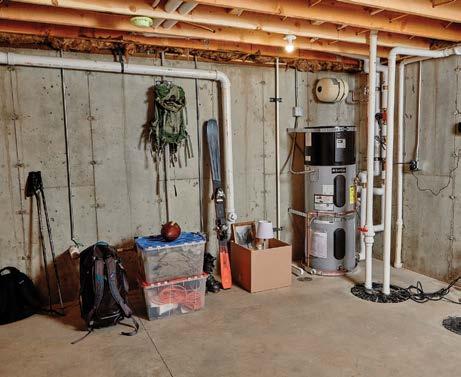
The life expectancy of a standard water heater is about 10 years. If your water heater is older than that or showing signs of failing, you may want to consider replacing it with a heat pump water heater before it fails.

It’s easier to find the product you want when it is not an emergency replacement. It also can be more expensive to replace it during an emergency. While heat pump water heaters are sold at a higher price than standard water heaters, the cost savings over time can o set the purchase and installation cost — and will result in a more energy e cient home. You also are likely to save by taking advantage of sales, rebates, or tax credits. Check with your electric utility, state department of energy and federal tax information before purchasing a new water heater.
I installed a heat pump water heater in my home. I love it and can see how my energy use has decreased since installation. Now, if I can only figure out how to get my children to take shorter showers.
 Ideal placement of a heat pump water heater is in an unconditioned space, such as a garage or unheated basement. Photo Credit: Hot Water Solutions
Miranda Boutelle is the chief operating o cer at E ciency Services Group in Oregon, a cooperatively owned energy e ciency company.
By moving heat instead of creating it, a heat pump water heater uses 60% less energy than electric storage water heaters.
Photo Credit: Hot Water Solutions
Ideal placement of a heat pump water heater is in an unconditioned space, such as a garage or unheated basement. Photo Credit: Hot Water Solutions
Miranda Boutelle is the chief operating o cer at E ciency Services Group in Oregon, a cooperatively owned energy e ciency company.
By moving heat instead of creating it, a heat pump water heater uses 60% less energy than electric storage water heaters.
Photo Credit: Hot Water Solutions



 by Abby Berry
by Abby Berry

There are a number of reasons why people are interested in cutting back on energy consumption — some are primarily motivated to save on their monthly energy bills while others may be more concerned about reducing their personal carbon footprint.


Actively practicing energy e ciency and conservation provides multiple benefits. For parents, being more conscious about energy use can be used as a tool to teach kiddos about sustainable habits for the future; conserving energy also means fewer carbon emissions, which results in better air quality and a healthier environment; and I think we can all agree that saving money on our monthly utility bills is a great reason to monitor home energy use.
Regardless of why you’re interested in using less energy, there are several smart phone apps that can help you do just that!







I know what you’re thinking, and yes — to use a smart thermostat app, you must purchase a smart thermostat. But heating and cooling make up a large portion of the average home’s energy consumption (and cost!), so saving on heating and cooling can make a big impact on bills. Smart thermostats and their accompanying apps are handy and promote energy ecient behavior–and these devices have become much more a ordable over the years. You can purchase an ENERGY STAR®-certified smart thermostat for as low as $100, which can save you 8% on annual heating and cooling costs, about $50 per year. The device will quickly pay for itself, and you’ll gain insight into better ways to heat and cool your home. Plus, the ability to control the thermostat from anywhere can equate to real savings. We recommend trusted brands and devices, like Google’s Nest Learning Thermostat and Ecobee’s Smart Thermostat.














If you’re wanting to reduce energy use at home, it’s important to know where your consumption is going. Energy cost calculators can help pinpoint your energy use with a few simple steps and identify areas to save. The concept is pretty simple; just plug in the wattage of your various appliances and how often you use them to see which are using the most energy. Most energy cost calculator apps are free and can be downloaded to any Apple or Android device. If you browse the app store, you’ll find multiple energy cost calculator apps, but most are similar in functionality. Be sure to read the app’s reviews and download the one that best aligns with your energy e ciency goals.
If you’re competitive and enjoy gamifying — well, everything — the JouleBug app is right up your alley. JouleBug makes energy conservation simple and fun through personal tasks and badges earned within the app, group challenges you can tackle with friends, and communities you can join to learn about local sustainability e orts. The JouleBug app is free and can be downloaded to Apple or Android devices, and it’s an easy tool to make saving energy fun.
These are just a few apps that can help you find new ways to save energy. Smart light bulbs are typically paired with apps for convenient control of home lighting; smart plugs also come with apps to help you control how you power everyday devices and electronics. Whether you use an app or not, saving energy is always a smart idea that can help you save money on your monthly bills and reduce your carbon footprint.
Abby Berry writes on consumer and cooperative a airs for the National Rural Electric Cooperative Association. Energy cost calculator apps can help pinpoint your energy use with a few simple steps and identify areas to save. A smart thermostat paired with a smart phone app can help you manage energy used to heat or cool your home, which can help you save energy and money.






Storm season is upon us, which means greater potential for power outages. If you’re planning to use a portable generator in the event of an outage, your electric co-op reminds you to play it safe.
With proper use and maintenance, portable generators can provide great convenience during an outage. However, when generators are used incorrectly, they can be extremely hazardous. In a 2022 report, the Consumer Product Safety Commission estimated 85 U.S. consumers die every year from carbon monoxide (CO) poisoning caused by gasolinepowered portable generators.





Install backup CO alarms. Keep children and pets away from portable generators at all times.



Position generators at least 25 feet outside the home, away from doors, windows, and vents that can allow CO to enter the home.
Ensure your generator is properly grounded. Use a portable ground fault circuit interrupter (GFCI) to prevent electric shock injuries.
Use three-pronged extension cords that are rated to handle the load of the generator. Inspect extension cords for cuts, frays, or other damage before use.

Operate a generator inside your home or an enclosed (or partially-enclosed) space. Generators produce high levels of CO, which can be deadly.
Rely on generators as a full-time source of power. They should only be used temporarily or in emergency situations to power essential equipment or appliances.
Open windows or doors while the generator is running.






Overload generators. They should only be used to power essential equipment. Make sure your generator can handle the load of the items you plan to power.

Connect generators directly into household wiring unless you have an appropriate transfer switch installed. If a generator is connected to a home’s wiring without a transfer switch, power can backfeed along power lines and electrocute utility lineworkers making repairs.
While generators provide convenience during power outages, they can quickly become hazardous – even deadly – if improperly operated. Before you operate a portable generator, be sure to thoroughly read the owner’s manual for important safety information and tips.
Abby Berry writes on consumer and cooperative a airs for the National Rural Electric Cooperative Association.










By moving heat instead of creating it, a heat pump water heater uses 60% less energy than electric storage water heaters. That can add up to hundreds of dollars a year and thousands during the life of the water heater. Improved controls make it easy to set the desired temperature and programming, including vacation mode, which saves energy when you are out of town.
Some models o er Wi-Fi connectivity to be controlled by a smartphone from anywhere. Other helpful features include leak detection and automatic shuto .

Consider upgrading to an energy e cient heat pump water heater. Heat pump water heaters — also called hybrid water heaters — use heat pump technology to heat water more e ciently than a standard electric storage water heater. Think of them as a standard water heater with a heat pump on top. The heat pump heats the water two to three times more e ciently than the electric elements, but the unit still has the electric elements as backup, if needed.






A heat pump water heater uses heat from a room to heat water. It tends to make the space about 2 degrees cooler, which is something to consider before installation. Ideal placement is an unconditioned space, such as a garage or unheated basement. A heat pump water heater requires enough space around the unit to supply the air needed for e cient operation — about 750 cubic feet.
Heat pump water heaters tend to be slightly taller than storage water heaters and require additional clearance above the unit to access the filter for cleaning. If your water heater is in a conditioned space or a room smaller than the unit requires, venting might be a solution for your installation. Another consideration is noise. A heat pump water heater generates about as much noise as a modern dishwasher, so it may not be a good solution if the water heater is located where sound could be a nuisance. Installing a heat pump water heater is much like installing a standard electric water heater, except for the location of the cold-water inlet, which is located at the bottom of the unit.
Because moisture in the air condenses when it is drawn through the heat pump, it also requires a condensate drain that must be routed to a drain or pumped outside of the home.








Heat pump water heaters can replace electric, gas, or propane water heaters. They typically require a 240-volt circuit, which might necessitate an electrical upgrade by a licensed electrician.


QI’m looking for options to replace my old water heater. What should I choose to make my home’s water heating more e cient and save money?Heat pump water heaters make it easy to set the desired temperature and programming, including vacation mode, which saves energy when you are out of town. Photo Credit: Hot Water Solutions
Here are some details about their e ciency, how the units operate, installation considerations, and when you should replace your old water heater.



The life expectancy of a standard water heater is about 10 years. If your water heater is older than that or showing signs of failing, you may want to consider replacing it with a heat pump water heater before it fails.
It’s easier to find the product you want when it is not an emergency replacement. It also can be more expensive to replace it during an emergency. While heat pump water heaters are sold
at a higher price than standard water heaters, the cost savings over time can o set the purchase and installation cost — and will result in a more energy e cient home.
You also are likely to save by taking advantage of sales, rebates, or tax credits. Check with your electric utility, state department of energy and federal tax information before purchasing a new water heater.
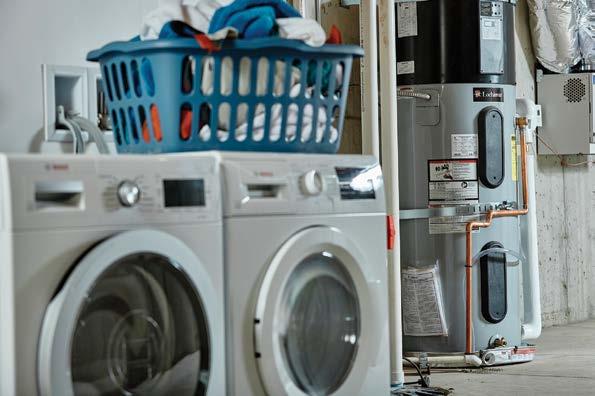
I installed a heat pump water heater in my home. I love it and can see how my energy use has decreased since installation. Now, if I can only figure out how to get my children to take shorter showers.
Miranda Boutelle is the chief operating o cer at E ciency Services Group in Oregon, a cooperatively owned energy e ciency company.

In the Jan. 2023 issue of the magazine, we incorrectly listed the congressmen who serve Yazoo County.
U.S. Rep. Bennie Thompson represents Yazoo County and the members of Yazoo Valley Electric. Today in Mississippi regrets the error.
 Ideal placement of a heat pump water heater is in an unconditioned space, such as a garage or unheated basement. Photo Credit: Hot Water Solutions
By moving heat instead of creating it, a heat pump water heater uses 60% less energy than electric storage water heaters.
Photo Credit: Hot Water Solutions
Ideal placement of a heat pump water heater is in an unconditioned space, such as a garage or unheated basement. Photo Credit: Hot Water Solutions
By moving heat instead of creating it, a heat pump water heater uses 60% less energy than electric storage water heaters.
Photo Credit: Hot Water Solutions


 by Abby Berry
by Abby Berry

There are a number of reasons why people are interested in cutting back on energy consumption — some are primarily motivated to save on their monthly energy bills while others may be more concerned about reducing their personal carbon footprint. Actively practicing energy e ciency and conservation provides multiple benefits. For parents, being more conscious about energy use can be used as a tool to teach kiddos about sustainable habits for the future; conserving energy also means fewer carbon emissions, which results in better air quality and a healthier environment; and I think we can all agree that saving money on our monthly utility bills is a great reason to monitor home energy use.
Regardless of why you’re interested in using less energy, there are several smart phone apps that can help you do just that!










I know what you’re thinking, and yes — to use a smart thermostat app, you must purchase a smart thermostat. But heating and cooling make up a large portion of the average home’s energy consumption (and cost!), so saving on heating and cooling can make a big impact on bills. Smart thermostats and their accompanying apps are handy and promote energy ecient behavior–and these devices have become much more a ordable over the years. You can purchase an ENERGY STAR®-certified smart thermostat for as low as $100, which can save you 8% on annual heating and cooling costs, about $50 per year. The device will quickly pay for itself, and you’ll gain insight into better ways to heat and cool your home. Plus, the ability to control the thermostat from anywhere can equate to real savings. We recommend trusted brands and devices, like Google’s Nest Learning Thermostat and Ecobee’s Smart Thermostat.













If you’re wanting to reduce energy use at home, it’s important to know where your consumption is going. Energy cost calculators can help pinpoint your energy use with a few simple steps and identify areas to save. The concept is pretty simple; just plug in the wattage of your various appliances and how often you use them to see which are using the most energy. Most energy cost calculator apps are free and can be downloaded to any Apple or Android device. If you browse the app store, you’ll find multiple energy cost calculator apps, but most are similar in functionality. Be sure to read the app’s reviews and download the one that best aligns with your energy e ciency goals.
If you’re competitive and enjoy gamifying — well, everything — the JouleBug app is right up your alley. JouleBug makes energy conservation simple and fun through personal tasks and badges earned within the app, group challenges you can tackle with friends, and communities you can join to learn about local sustainability e orts. The JouleBug app is free and can be downloaded to Apple or Android devices, and it’s an easy tool to make saving energy fun.
These are just a few apps that can help you find new ways to save energy. Smart light bulbs are typically paired with apps for convenient control of home lighting; smart plugs also come with apps to help you control how you power everyday devices and electronics. Whether you use an app or not, saving energy is always a smart idea that can help you save money on your monthly bills and reduce your carbon footprint.
Abby Berry writes on consumer and cooperative a airs for the National Rural Electric Cooperative Association. Energy cost calculator apps can help pinpoint your energy use with a few simple steps and identify areas to save. A smart thermostat paired with a smart phone app can help you manage energy used to heat or cool your home, which can help you save energy and money.Both musicians and writers probably spring to mind first. We are, after all, the birthplace of B.B. King, Elvis Presley, and Jimmie Rodgers as well as William Faulkner, Eudora Welty, and Willie Morris.
But Mississippi is also home to important and talented visual artists.
For the March issue of the magazine, we visited with artist and OB-GYN physician Dr. J. Kim Sessums of Brookhaven.
Yes, you read that right. Sessums is an artist and a doctor.
Sessums works full time with his OB-GYN practice and creates commission artwork for private collections and public monuments.
Sessums has created works as diverse as the African American Soldier monument at Vicksburg National Military Park to a sculpture of Coach Johnny Vaught at Vaught Hemingway Stadium at Ole Miss.

A product of rural Mississippi — he grew up near Forest in Scott County — Sessums has a unique story about his approach to creating art.
We hope you enjoy the story.
March is an exciting time around the Electric Cooperatives of Mississippi o ces. By the time you have read this column, we

have put on the annual Cooperative Leaders Workshop in Jackson for our youth.
Our electric cooperatives fund the workshop for high school juniors from all over the state.
During the workshop, we give the students an opportunity to learn, grow, and experience. We make sure the students understand the impact electric cooperatives have on their lives and communities.
The workshop is a perfect example of one of the Seven Cooperative Principles that guide co-ops by putting the needs of our members first — Concern for Community.
In next month’s issue, I will let you know how the students did.
We hope you enjoy the March issue.
Delta blues to coastal dreams. Cotton white to marsh reeds, waving in the sultry breeze.
Rolling semi mountain hills to paper flats. Muddy sip, tugboats pushing, roosters crowing, chicks growing.
Summer ballfields and winter football, one-day wiping sweat to jacket warmth.
by Michael Callahan Executive Vice President/CEO Electric Cooperatives of Mississippi






Deer abounds to catfish frying, jaw dropping sunrises to take your breath away sunsets.
by Pamela Dillon, a resident of Tylertown and a member of Magnolia Electric




